
|
| That's me, Pattie Weiss Levy. |
A Modern-Day "Ima" on a Modern-Day Bimah
(With
new content posted every WEEK!)

|
|
Wednesday, November 30, 2011
A Word From the Weiss
 “What’s wrong!?!” Those are typically the first words out of my son’s mouth when he calls and I answer
the phone. I always assure him I'm fine. But this only provokes a firm and audibly doubt-filled follow-up. “I don’t
believe you,” he says. “What’s wrong!?!” Those are typically the first words out of my son’s mouth when he calls and I answer
the phone. I always assure him I'm fine. But this only provokes a firm and audibly doubt-filled follow-up. “I don’t
believe you,” he says.
OK, no one's ever actually fine. And no one really likes to lie, particularly to their own children (although no one wants to burden their children
with their everyday tsuris, either). But when a friend got an unexpected query from her own son the other night,
her first reaction was to wish that she could get away with… well, let’s call it bending the truth.
One of her sons was having a bris to celebrate the
birth of his own newborn son. This prompted his 22-year-old brother, who’s become an increasingly observant Jew in recent
years, to ask if my friend and her husband had held a bris for him back when he had been born.
She
was reluctant to admit the truth, fearing that he would feel compelled to have one now, as a grown man, complete with the,
er, necessary anatomical adjustments. For the truth was that he’d indeed been circumcised, but the procedure had been
performed in the hospital, rather than during the traditional religious ritual held at home.
As a Reform Jew, she had not felt motivated to have
the deed done with an audience. “Seriously,” she said to me defensively. “Did you have a bris when Aidan
was born?”
Funny that she should ask. In answer, I was tempted to tell her about the one and only bris I ever attended.
It all began at a baby shower more than a decade ago, although little has changed since then. After all, a bris is still a
bris.
* * *
There she sat, my dear friend Hallie, ready to burst with both child and big news.
Her soon-to-be-born son would be circumcised amid pomp and circumstance and platters of smoked fish. She wanted everyone at
her baby shower to prepare for this: Her little Daniel was going to have a bris.
Now,
for most expectant Jewish mothers, such news would be a matter of course. Jewish law requires that newborn boys undergo this
circumcision ceremony on their eighth day of life. Hallie, my former college roommate, however, had never put much stock in
tradition. It went far beyond not attending shul regularly or lighting candles on Shabbat. Due to give birth within two weeks,
she wasn’t even married. Hallie had deliberately
become pregnant when her fortieth year had found her with neither a husband nor high expectations that her current boyfriend
would ever commit.
She had spent the past nine months trying to convey to family and friends why she’d chosen to become
a single mother. Explaining her newfound religious fervor was, by comparison, a snap. She was going to have a bris, she declared,
because I had talked her into it.
“Me?” I asked, genuinely amazed.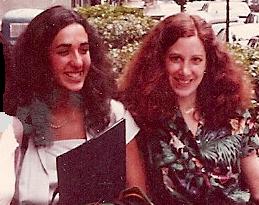
Certainly, we’d discussed the subject at length. My aim, though, hadn’t
been to persuade her one way or another, merely to discuss the options. “I can’t believe I talked you into anything,”
I protested. “Tell me. What did I say?”
In fact, Hallie’s mother had recruited me for this very purpose, but I’d
admitted up front that I was an unlikely candidate for the job. How could I possibly argue in favor of this ritual? My own
son had been circumcised in the hospital. I still cringe remembering how my father had called me the day after he was born.
“I forgot to ask,” he’d said eagerly. “When’s the
bris?”
“Ummm, well,” I’d stammered back, “we sort of had it this morning.”
How could I convince Hallie that her son needed a
bris? I had never even attended one. Raised as a Reform Jew, I respected most religious rites, but this was one tradition
I’d never understood. Clearly, it was a ritual, I said, conceived of and perpetuated by men.
What
had the ancient rabbis been thinking when they came up with such an idea? How odd to summon a sizable audience for so intimate
a medical procedure. Why expose your precious, delicate newborn to a houseful of guests coughing up germs? Never mind that,
eight days after giving birth, the last thing any new mother needs is to entertain a hungry crowd or, even worse, face everyone
that she knows in a dress.
“It isn’t about the mother!” Hallie’s mother, Judy, had retorted. “The mother
hardly needs to be there. She’s just supposed to make a five-minute appearance in a bathrobe.”
“She is?” I’d asked in astonishment.
I found this hard to believe. How could you ask your aunts, uncles, cousins and in-laws to drive all the way from nether regions
like New Jersey and then show up in a terrycloth shmatta and barely say hello?
Still, what if Judy was right? Suddenly, I’d
seen this ritual in a less glaring light.
And
so it was that I’d acquiesced to at least broach the idea of a bris with Hallie. Meanwhile, I’d spent weeks investigating
her mother’s bathrobe theory. I’d asked my friends,
my cantor, my stepfather (a self-styled font of Jewish knowledge) and the senior rabbi at my synagogue. (I’m afraid
I don’t actually know any mohels.) Not one of them had ever heard of it. Hallie said her mother had probably made the
whole thing up.
Similarly, I had made up my arguments as I went along.
I’d told my old friend of my newfound ambivalence. In the
many years since my son had been circumcised unceremoniously by a doctor, I’d given the matter very little thought.
Never had I been stricken for one agonizing moment with regret, nor imagined, “Oh, if only we’d had that bris,
our lives would have turned out so much better!”
If I had it to do all over again, though, I said, I would unquestionably have a bris.
For in the years since my children had been born, I’d begun reaching back to my roots.
Who,
I’d decided, did I think I was to tamper with 4,000 years of tradition? I’d come to the conclusion that religion
was vital to people’s lives, and that mine was no exception. After years of youthful scoffing at what often felt like
the tedium of temple, I’d come to recognize how enriching it felt to follow traditions that were thousands of years
old. In addition to observing major Jewish holidays, I’d also begun lighting candles on Shabbat and making a special
dinner for my family each Friday night. It was essential, I’d realized, to be part of an ongoing cultural community
much larger than oneself.
Feeling
connected to such a community was especially critical in raising children. What better way is there to give them a strong
sense of identity, spirituality and values? For Jews, that requires more than administering liberal doses of chicken soup
and an occasional bite of schmaltz herring. It also demands participation in holidays and rituals.
I’d mentioned another conclusion that had begun
to guide me in recent years. Apparently it was persuasive enough that, in front of all her baby shower
guests, Hallie parroted it back to me now.
“You
did talk me into it,” she charged. “I can tell you exactly what you said: ‘There are so few things in life
that are truly wonderful that, if you actually have one, you should celebrate it.’ ”
Indeed, I’d said those words. And what greater
joy could there be than the birth of a deeply wanted child? And so, three weeks later, I returned to New York City to see
Hallie’s newborn son, Daniel, and help plan my first bris.
After gawking and kvelling over the infant,
we got down to serious business. Rather, Hallie and her mother got down to business. I just stared in disbelief.
They’d settled upon throwing a kosher affair,
for the benefit of the four Orthodox Jews among the 50 guests they expected. Yet just three days before the event, they hadn’t
ordered a thing.
“Who’s the caterer?” I asked.
“There
is no caterer,” Judy said. This bris, aside from the mohel’s participation, was basically do-it-yourself. This
is not to say that Hallie or her mom would cook. They would procure platters of smoked fish from a deli called Murray’s.
Desserts would be purchased from their favorite bakery, The Royale. Bagels would come from New York’s finest, H&H.
Flowers, beverages, tables and chairs would be obtained from other vendors.
Judy’s friend had a maid who would help clean
up afterwards. But where could they get a bartender, waitresses, and percolators large enough to make coffee for 50?
“A caterer could supply them,” I said.
“There
is no caterer!” they cried in unison.
Maybe I’d been right to diss having a bris. Doesn’t a new mother have enough
to do, what with nursing, getting little sleep and choosing between Pampers and Huggies? This bris business was clearly a
lot of work. Who would pick up all the pieces from their assorted sources and assemble them into an organized feast?
The
final blow came when one of the Orthodox guests phoned. Dossie, a mother of seven, said she doubted that Murray’s kosher
fish was kosher enough for her. She also doubted that bagels from H&H would get her husband’s A-OK.
“Please don’t be insulted,” Dossie said, “but I doubt we’re going to eat anything.”
Why, she asked, hadn’t Hallie hired a kosher caterer?
“Why didn’t you?” I asked. Maybe it wasn’t too late
to hire one now.
“I don’t know any kosher caterers,” Hallie groaned.
“Where’s
your phone book?” I asked.
The Yellow Pages had no special section conveniently labeled “Caterers, Kosher.” A few vendors
had ads touting kashrut capabilities, but most were located on Long Island. Who knew if any others were kosher enough
for Dossie, let alone any good?
Thumbing
through pages of fine print, my eyes were drawn to one two-line ad. The name sounded Jewish, and the address placed it right
in Hallie’s neighborhood. The man who answered said they were indeed kosher. Whether they were available on such short
notice was another question. He’d speak to the chef and call us back.
After waiting for half an hour, we decided to walk
over and check it out in person. Hallie figured the address placed it next door to the temple on her corner. She was wrong.
It was located inside the temple. An Orthodox temple. “They’re kosher enough,” she said.
This temple wasn’t just any Orthodox temple.
It was a fancy, upscale temple. “They’re good enough,” Hallie said.
The
chef gave the go-ahead. Within an hour, we’d ordered everything: trays of smoked fish, sliced vegetables and fruits.
Bagels, pastries and challah. Folding chairs and tables. Even a bartender and wait staff of four.
This place had everything we needed. Not
only could they supply coffee for 50, but also sugar and Sweet ’n’ Low.
This all-inclusiveness came at a hefty price: $50
a head. Hallie suddenly hesitated. “When do you need to know?” she asked.
The caterer didn’t look pleased. Shouldn’t
she be thanking the God of Abraham, Isaac and Jacob that he was willing to serve her? “Today,” he replied firmly.
“Or else early tomorrow morning. And I do mean early.”
I felt a little guilty about having insinuated myself, but not as guilty
as I felt when I called Hallie the following afternoon.
“Did you settle everything with the caterer?” I asked.
“There is no caterer,” she said.
She’d
phoned the firm shortly after 6 p.m. and left a message on the answering machine, agreeing to everything. The next morning,
the caterer had called back.
“We can’t get you any tables and chairs,” he said coldly.
“Why can’t you get me tables and chairs?”
“They
had to be ordered by last night,” he said. “I needed to hear from you by 5.” Why, she asked, hadn’t
he explained that in the first place? He insisted that he had.
“No tables and chairs?” she asked with a sigh. “All
right, I’ll get them myself. Any other problems?”
“I
can’t get you any smoked whitefish or sable.”
“No whitefish?” she asked. “No sable? How about lox?”
“No lox,” the caterer said.
“What kind of fish can you get me?”
“No
fish,” the caterer said.
Fish was the basis of this dairy meal. All they were serving was fish. “No fish?” Hallie asked.
“Then, I’m sorry, no thank you. I’ll get it all myself!”
And so she and her mother had spent all day Friday
frantically rushing around, ordering everything from seven or eight separate vendors. I hadn’t helped simplify anything.
I’d simply set them back a day.
With so many separate pieces, what were the chances that one wouldn’t fall through? What if the help
didn’t show? What if there were coffee, but no Sweet ’n’ Low?
I began to wonder if my friend would ever forgive
me. One look at her face the following Sunday gave the answer.

Hallie
had prevailed upon her brother and sister-in-law to host the affair. Their apartment was considerably larger than hers, but
I still couldn’t fit through the door. Dozens of people jammed the entryway.
And
there my friend stood, in a nice dress, no less, looking ecstatic -- more radiant than the day she had graduated from medical
school, or any other time I could recall.
She had told me she planned to eschew both fancy garb and the bathrobe approach in
favor of a casual pants outfit. But there she was in floral-print black rayon, hugging my children, my husband, and me.
I’m
not sure I could cheerfully greet everyone I knew on about four hours’ sleep. But she looked positively exuberant and
thrilled to see every one of us.
Which is more than I could say for her mother.
Judy
bustled past, balancing a tower of plastic cream cheese tubs in various hues. “The next baby born in this family,”
she growled, “is getting circumcised in the hospital!”
Evidently, the copious efforts involved had taught her the proverbial
lesson about being careful what you wish for. Still, she -- or someone -- had performed the work well. The dining room table was groaning under the weight of gorgeous platters of smoked fish. Pyramids
of pre-sliced golden bagels rose nearby amid trays of silvery onion discs and ruby red tomato wheels. Olives, sculpted vegetables
and a ruddy dusting of paprika embellished pastel mounds of tuna, egg salad and glistening chopped eggplant. performed the work well. The dining room table was groaning under the weight of gorgeous platters of smoked fish. Pyramids
of pre-sliced golden bagels rose nearby amid trays of silvery onion discs and ruby red tomato wheels. Olives, sculpted vegetables
and a ruddy dusting of paprika embellished pastel mounds of tuna, egg salad and glistening chopped eggplant.
The dessert table was a dieter’s nightmare come
to life. Baskets bulged with raisin-studded rugelach and Russian coffee cake. Silver trays nested elegant butter cookies decorated
with chocolate lace and maraschino cherry centers. Two vats of fruit salad could barely hope to offset the hazards posed by
creamy New York cheesecake.
I
began to wonder if a bris is indeed intended to usher in an eight-pound bundle of joy, or merely to allow everyone present
to usher in eight pounds.
Maybe both. As with most weighty Jewish matters, business comes with pleasure.
Business, however, also comes first. I looked around
for the mohel, expecting a short, stooped old codger with a wispy white beard. Wrong! Philip Sherman was a tall, robust young
man with a bushy, dark beard. After making sure Hallie had all the necessities -- from sterile gauze pads and Bacitracin ointment
to kosher wine in a silver kiddush cup -- he summoned everyone present to gather around him in the hall.
The lively oratory he proceeded to deliver was clearly
designed to educate novices such as myself.
Sherman
explained the difference between a circumcision done in a hospital and the one he was about to perform. The former, he said,
was merely a medical procedure. The latter was a religious ritual many centuries old.
The Hebrew word “brit,” he said, translates
as “covenant.” The bris ceremony, or Brit Milah, reaffirms the agreement made between God and Abraham,
the first Jew, more than 3,500 years ago that he and all Jewish males after him would have the foreskin of their penis removed.
“For the Jewish people, Brit Milah is a physical sign of the covenant,” he said, “an indelible
mark which links one to the Jewish people, the Torah and its commandments.”
Being circumcised, however, does not make you a Jew,
he noted. You must be Jewish by birth.
Anyone, he said, can attend a bris; you don’t need to be invited. But if you’re invited, you
must go. (And I thought those offers you can’t refuse were strictly Italian.)
He also explained the roles of the people integrally
involved in the ceremony. Hallie’s mother was the designated kvater. The term sounds something like the word
for godparent, he said, but there are no godparents in the Jewish faith. It refers, rather, to the person given the honor
of bringing the newborn in.
At
this, Daniel arrived in the arms of Judy, who looked unspeakably thrilled to be there after all. Hallie’s father, Larry,
looking a little less convinced, was the sandek. He had the honor of holding Daniel while the mohel did his thing.
That
thing he did, he observed, would take only about 40 seconds. A hospital job, on the other hand, clocks in at about 40 minutes.
In the hospital, he stated, a baby is strapped down for the procedure. Here, he’d be cradled lovingly by his grandfather,
then comforted with kosher wine.
It was hard to tell whether these comparisons were meant to allay onlookers’ fears or merely to help
the mohel drum up business. Face it, this is one profession in which the results are never put on public display. Can you
blame Sherman for announcing his hours of availability to the crowd, then placing pamphlets and business cards by the front
door?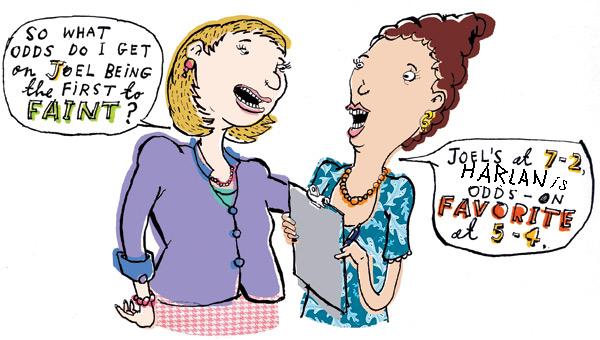
I’d
been deliberating about whether to watch the procedure, feeling a mixture of morbid curiosity and anxious queasiness. Meanwhile,
my husband had kept telling me about the only bris he’d ever attended -- as a guest. He’d looked and promptly
passed out.
I had no such indecision about letting my children observe. Sherman banished them to another room, explaining that youngsters
are not permitted to watch.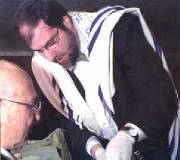
I
was similarly relieved of personal viewing. The apartment was so crowded that I couldn’t see a thing. I could only imagine
what was happening, based on sound effects.
To my relief, the mohel abandoned his play-by-play account at this point. Also mercifully,
the baby didn’t display any signs of acute pain. He began crying the moment his diaper was removed, but his whimpering
didn’t grow louder during the procedure. Instead, it instantly abated when the wine-soaked gauze was placed in his mouth.
Hallie
had retreated to another room before the surgical segment began. Now, with Daniel sucking contentedly on Manischewitz, Sherman
summoned her, along with a small group who would serve as the baby’s significant others: Hallie’s boyfriend Jeff,
who had stuck by her throughout the pregnancy, her brother and sister-in-law, two medical school classmates, and me.
All
we had to do was stand beside the mother and child. Simple enough, and yet so moving. Jews may not have godparents, but joining
this small circle of friends, I felt a bond and sense of responsibility for this child that I knew would last for life.
As we
surrounded the quietly sucking infant, Sherman instructed Hallie to repeat after him the mother’s Brit Milah
blessing: “Barukh atah adonai elohenu melech ha-olam, ha-gomel le-hayavim tovot shel-gemalani kol tov. Blessed
are You, Lord our God, King of the universe, who bestows good and who has shown me every kindness.”
Afterwards,
they popped open Champagne and pulled the plastic wrap off the fish. Catered or not, it was an incredible feast. Even Orthodox
Dossie couldn’t resist.
As
for me, at last, a little too late, I grasped the significance of holding a bris. There’s something so moving and magical
about having everyone important in your life come together to wish you well.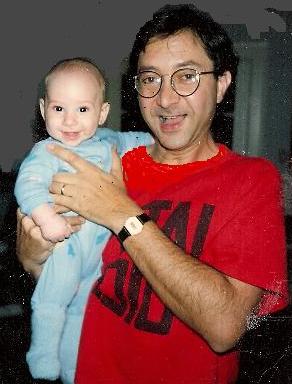
There are few other times in your life that this happens: your Bar or Bat
Mitzvah (when you’re too young to appreciate it). Your wedding (when you’re too nervous). And then, barring any
major birthday or wedding anniversary (you’re too old) or your election to public office (you’re too famous),
it doesn’t happen until your funeral (for which you may be present spiritually, but you don’t get to kiss anyone
or eat lox).
How
wonderful to have the people you love gather with you, in life, to celebrate new life. And how ridiculous to let concerns
about vanity deprive you of this joy. No one who truly cares about you gives a hoot that eight days after giving birth, you
may still need to wear a maternity dress.
It's now been 14 years since
that wonderful event, and the main thing I remember about Hallie at the bris is how she looked from the neck up: luminously
beaming for all the world to see.
Oh, if only my son had been given a bris! Maybe our lives would have been better.
4:52 pm
Thursday, November 24, 2011
A Word From the Weiss
 So often, in trying to explain the strangeness, serendipity and unpredictability of life, I find myself beginning or ending sentences
with the phrase “under normal circumstances.” (“Under normal circumstances, I post this blog every Wednesday,
although I finished it so late that it’s already technically Thursday.” Or, "Holidays are so steeped in tradition
that, despite being special occasions, they are mostly all about what we do 'under normal circumstances.' ") So often, in trying to explain the strangeness, serendipity and unpredictability of life, I find myself beginning or ending sentences
with the phrase “under normal circumstances.” (“Under normal circumstances, I post this blog every Wednesday,
although I finished it so late that it’s already technically Thursday.” Or, "Holidays are so steeped in tradition
that, despite being special occasions, they are mostly all about what we do 'under normal circumstances.' ")
But I’m beginning to realize as life goes on, and my kids begin more and more to lead their own lives, that there
are really no more normal circumstances. Every year is completely different. Especially when it comes to holidays.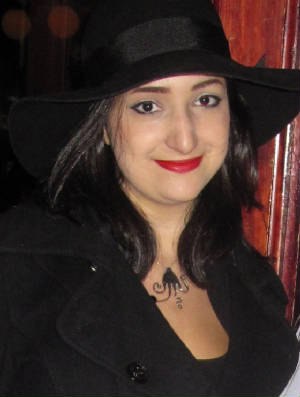
So, why is this Thanksgiving different from all other Thanksgivings? Many reasons. For one, it’s going
to be awfully quiet. Much moreso than under normal circumstances. After all, a key ingredient will be missing. Not the cranberry
sauce. Or the yams. Or stuffing. I mean a key player.
My daughter won’t
be home.
Allegra was invited to spend the holiday week with her boyfriend, Stevo, who moved to L.A. in late
October to take a great job that he couldn’t refuse. And that was an offer she couldn’t refuse.
We also aren’t getting together
with my brother’s family, which is what we do for Thanksgiving under normal circumstances. So it looked last week like
it was just going to be the three of us – my husband, my son, and me. Hearing this, my son Aidan, who is 25, proposed
yet another dramatic break with tradition.
He said that what would make him happy would be if he could cook
the holiday dinner this year.
Him. Not me.
“You mean you want us to come down to New York, so you don’t have to schlep all the way to Connecticut?”
I asked.
No, he said. He wanted to come home, as always, and cook the dinner there.
“OK,” I replied.
“Huh?” he asked, clearly shocked that I had acquiesced so easily (or perhaps that I had essentially called
his bluff). “You mean, for once I actually get what I want?”
“Sure,” I said. The fact was that
without my daughter there I wasn’t sure anything would feel right this year. It would be great for at least one of us
to get exactly what he or she wanted. It also might be nice for me not to be slaving away in the kitchen pretty much
all alone, as always. I generally do almost everything, including carving the turkey. Then again, he might not realize what
he was bargaining for. “Have you ever roasted a turkey before?” I asked.
This was met with a long pause.
“Maybe,” he finally replied.
I took that as a no. But that wasn’t a reason for me to say
no. I figured it would be fun to cook together. “Can I help?” I ask. “Or can I at least make the pies?”
“No,” he replied firmly. “You can’t lift a finger.”
“Fine,” I said. “Whatever
you say. But can I at least do the shopping?”
“No!” he declared. “I’m going to do it all.”
Again I agreed. My only issue was when he was going to do this. After all, under normal circumstances he wouldn’t
be home until Wednesday night at the earliest.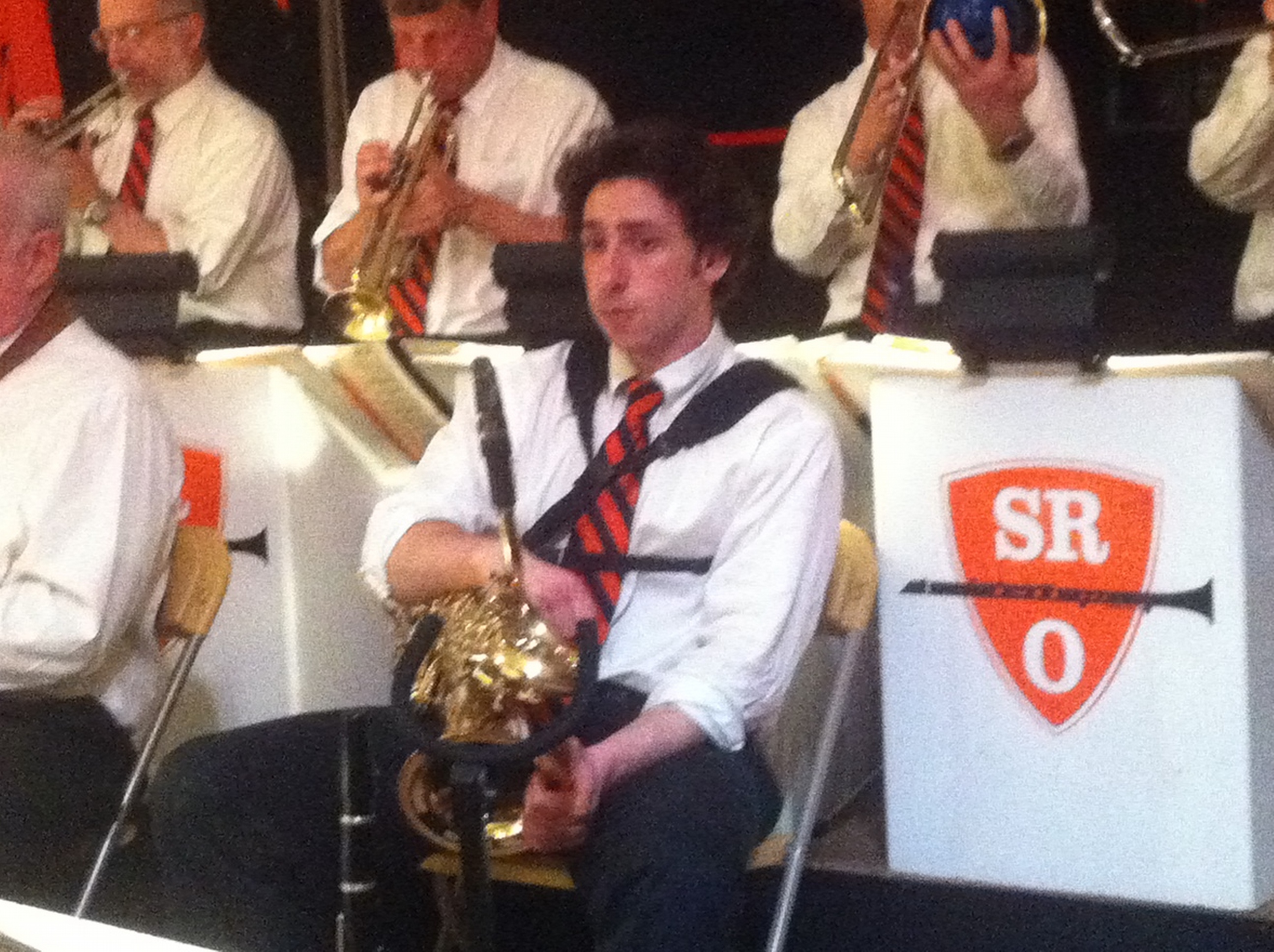
Again there came a long pause. “Woops,” he said. "The thing is, I think I have a gig in
the city on Wednesday night.” Normally, he plays the bari saxophone in a big band every Wednesday at a swing dancing
club in the Theater District called Swing 46. He said that he would look into whether they were playing this week or not.
So I figured we were back to square one… solo catering by NiceJewishMom.com. Which is what happens under normal
circumstances.
Meanwhile, Allegra was anticipating some dramatic changes of her own. As eager as she was to be reunited
with Stevo after nearly two months, she admitted that she would miss being with us. She also worried that her absence might
sabotage our holiday fun. Not wanting her to feel guilty, I assured her that although we’d miss her too, her presence
wasn’t required, just desired.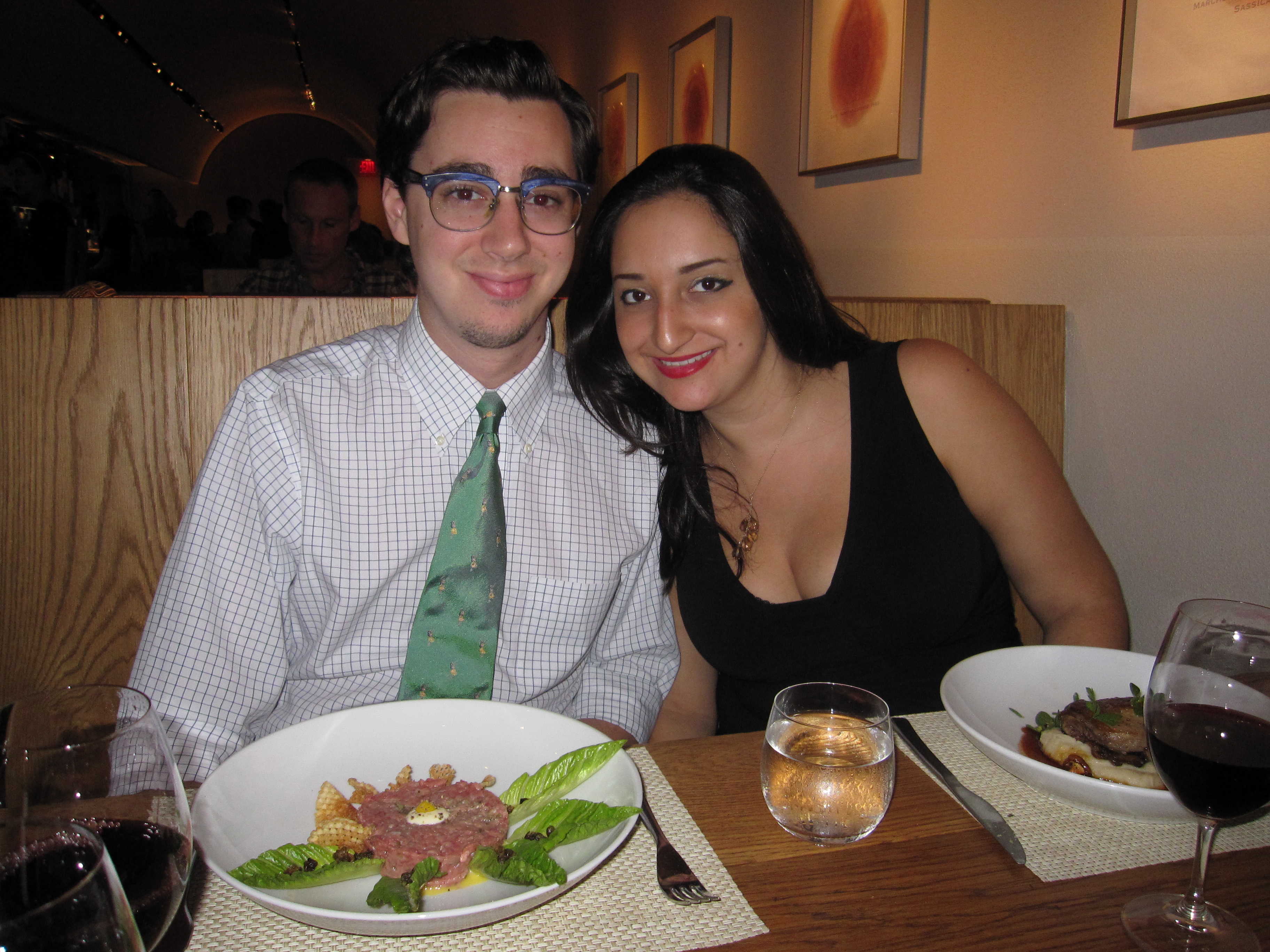
Then again, her absence meant that presents were required – gifts for the people she would be with instead. Although
she'd met Stevo’s mother and sister, who live in L.A., his parents are divorced and she had yet to meet his father and
stepmother. Since Stevo is living with them until he finds his own place, she’d be their guest for the week and felt
that house gifts were definitely warranted. She also wanted to bring just the right thing to make a favorable first impression.
I promised to help her choose something while my husband and I were visiting the city last weekend. My sense was
that she should bring something emblematic of New York.
But somehow, everything I suggested didn’t strike her as quintessentially
New York. It all just seemed quintessentially Jewish. Which was a problem. Even though Stevo’s stepmother is Jewish,
his parents are not. And although Allegra is decidedly Jewish and proud of it, she didn’t want to call that much attention
to their religious differences.
Bagels from H & H? Much too Jewish. Something yummy from Zabar’s? (Why not
just bring them a menorah?) Dare I even suggest chocolate rugelach or cheesecake?
Before going to the theater on Saturday night, we passed a bakery with gorgeous cookies in the window and
decided to investigate. Along with the usual assortment of butter cookies embellished with chocolate coating, multicolored
sprinkles and cherry centers, this place had some cute ones decorated to look like turkeys, all for $12 a pound. Allegra worried
that they wouldn’t taste fresh by the time she arrived late Monday night, though. She wanted to come back and
buy them on Monday afternoon before flying out. I warned her that she'd never have time to return to this shop before
going to the airport. But she wouldn’t budge.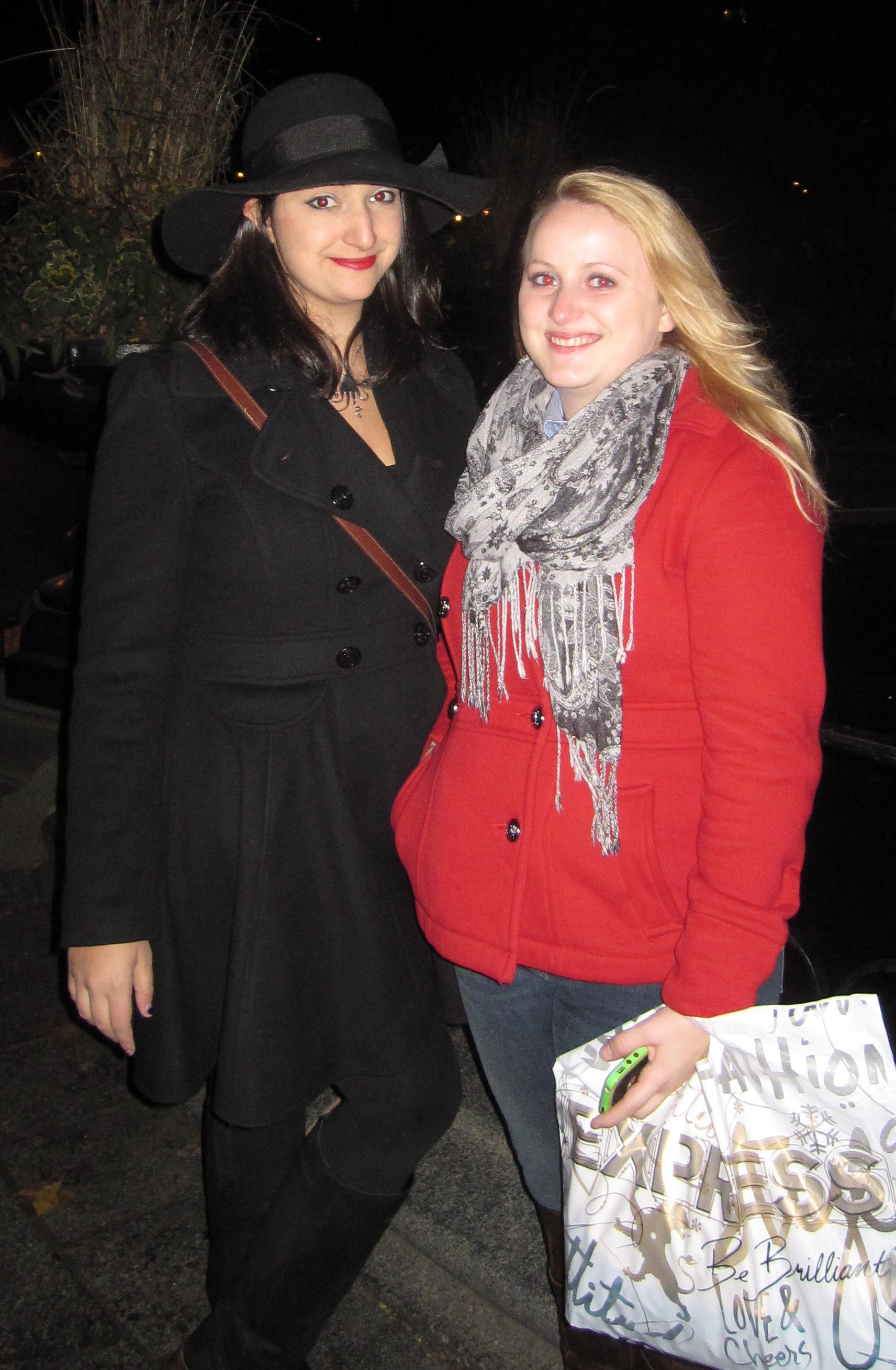
She insisted that she would have the whole day on Sunday to find something else, and I promised
to help her after my husband and I attended a brunch that day at his Cousin Ilene’s. But Allegra had her good
friend Shannon visiting from Boston for the weekend and ended up having no time to shop on Sunday. Meanwhile, we were having
such a great time eating lox, bagels and chocolate rugelach at Cousin Ilene’s that we didn’t leave till after 5.
By that point Allegra was frantically doing laundry and packing for her trip. So I offered to keep my eye out for
something appropriate for her to bring to L.A. while en route to dinner downtown with some friends.
The problem was that in addition
to bringing gifts for the macheltunum (in-laws), she was intent on buying gifts for their dogs as well. Stevo's
father had recently adopted two puppies, and she wanted to get them just the right things. I stopped into two pet
stores I passed along the way, but after eyeing the dog sweaters and bejeweled collars I realized that I didn’t know
anything about these pooches, other than that they were small.
“What breed of dog are they?” I
texted. I needed some basic information. Were they male or female? What did they weigh? What were their favorite colors? Did
they play tennis?
I didn’t want to make fun of her. The fact is, I tend to prefer most dogs to most people, and
choosing cadeaux for canines seemed like much more fun than picking out items for their owners. This also circumvented
the issue of choosing anything "too Jewish." The only real risk I could imagine was selecting a tiny
enough toy and later finding out that it was meant for a cat.
In response to my text message, Allegra forwarded a photo of the dogs. This hardly helped. She also texted
saying that what she really wanted to buy them was fancy treats from a dog bakery. I had no idea where she would find such
a place in New York, and my experience with our late beloved dog Zoe was that she would embarrass us at dog bakeries
repeatedly because when the owner offered her free samples, she would sniff them with disdain, then refuse to even lick them,
let alone let anyone put one in her mouth. Face it, bakeries -- even dog bakeries -- are really for people, not dogs.
So I decided to give up on this pursuit and let Allegra do it all herself on Monday.
Also, we were running late to dinner and needed to hop onto the subway. When we arrived on the Lower East
Side, we were rushing through the streets when I noticed some beautiful cookies in a bakery window. These resembled the butter
cookies Allegra had been tempted to buy the night before, only they were even more exquisite. The bakery, I learned, was
about to close. So I told my husband I would meet him at the restaurant. Then I ran inside.
I asked if they had any cookies
shaped like turkeys, but there were none. No matter. All of the pastries looked irresistible -- so much so that I simply
couldn't choose.
I explained to the dark-haired young salesgirl behind the counter that I was looking for something for my
daughter to bring to her boyfriend’s house in L.A. for Thanksgiving.
“How about some hamantashen?”
she suggested. She pointed to the triangular pastries filled with assorted fruit preserves and poppy seeds that Jews eat on
Purim to commemorate the three-cornered hat worn by wicked Haman. Baffled, I said that hamantashen weren’t right for
Thanksgiving at all.
“A chocolate babka, then?” she proposed, indicating a mouthwatering swirl cake studded with crumbs.
Jerry Seinfeld had once declared this to be the king of babkas on Seinfield. (Somehow, on Seinfeld they
never talked openly about all of the characters being Jewish. They just acted Jewish. And ate babka.) I shook my head vehemently.
Then, being even later to dinner, I simply asked for a pound of the cookies, which at $14 a pound were even pricier than
the ones at the first bakery. At least they looked like they were worth every penny. I watched as the girl assembled an assortment
in a white cardboard box, then weighed it on the scale and, after adding three more, bound it up neatly with red and
white striped string. Then, after tying a small bow, she reached into a drawer and pulled out a round orange sticker, which
she plastered in the center of the box.
“Moishe’s Kosher Bake Shop,” it read.
I
realized that I had rushed in so abruptly that I hadn't read the sign outside. But now it was too late.
I figured that if worse came to
worst, we would simply eat the cookies ourselves.
Indeed, when I told Allegra about my purchase the next morning and
then pulled out the box, she was not pleased. By coincidence, just as she was launching into full-fledged conniptions, Stevo
phoned from L.A., just in time to get in on a family argument.
“What’s wrong with bringing Jewish
desserts to my house?” he asked. “Who are you trying to impress?”
Allegra told him it wasn’t
a matter of trying to impress anyone, she just didn’t want to make the wrong impression. “I don’t want them
thinking I’m just some big Jew!”
Aidan, who was with us, didn’t hesitate to weigh in, too.
“Allegra, I think the cat’s out of the bag on that one,” he said. “They already know you are
just some big Jew!”
Allegra chose to ignore this and calmly (OK, maybe not so calmly; maybe more like hysterically) explained
to Stevo (and everyone listening) that she didn’t want to bring Jewish desserts to Stevo’s father’s house
because his parents were WASPs.
“We’re not WASPs!” he protested.
“Not WASPs?” she protested.
“Your uncle has a house in the Hamptons!”
“That’s just a fluke!” he countered. “My
stepmother’s Jewish!”
“Even so!” Allegra replied. “Your parents aren’t!”
But Stevo (who, although Gentile grew up with a Jewish best friend and is what we often refer to as "Jew
friendly") firmly stood his ground. “Please!” he begged her, assuring her it would be fine. “Just
bring Moishe’s Kosher Bake Shop!”
Allegra thought this over calmly after they’d hung up. She decided that he was right. The cookies would
be fine. Then she looked over the box and decided that she didn’t want to bring them after all because overnight, several
large greasy-looking stains had developed where the real butter in the cookies had bled into the cardboard.
Or maybe my cookies just weren’t
Jewish enough. She now wanted to bring chocolate rugelach instead.
She
also objected to my cookies because the box was already closed. “I’m not bringing anything to someone’s house that I haven’t tasted myself,”
she said.
Now we were getting somewhere. Having anticipated this, I revealed that I had bought four extra cookies
so that we could each have a taste. Then I whipped out a small white paper bag.
She reached in and pulled one out. But she said that she couldn’t break her diet. So she simply sniffed
the cookie. Then she sniffed it again. Then she popped it in her mouth anyway.
“Well?” I asked.
“OK, they’re incredible,” she allowed. The problem was that the box was still closed. “I’m
not bringing anything to someone’s house I haven’t actually seen.”
I hesitated to show the contents
to her. Once you take the string off a box like that, you can never get it back on quite right. But finally I relented, gently
easing it off.
She lifted the lid. She removed the waxed paper carefully folded across the top. Then her mouth fell open
at the breathtaking sight and heavenly scent of butter and chocolate wafting up.
“OK, I’m bringing them!”
she declared.
For good measure, we also picked up an assortment of hand-made chocolates at the bustling food emporium Eataly, on 23rd and
Sixth Avenue. Then, in a pet shop, we found two small plush dog toys shaped like ice cream cones. I suggested also bringing
a bag of Newman’s Own organic turkey and sweet potato dog treats. What could be better than that for a dog's Thanksgiving?
“That’s ridiculous!” Allegra sputtered, storming off. Then she came back a minute later. “No,
actually, it's cute.” It was also just the thing for George and Abbey.
George and Abbey?
“The dogs,” she said,
hastening to explain the derivation of the names.
“Think of the most famous George you know,” she prompted.
“Burns?” I asked.
“Huh?” she answered. Close, but no cigar. No, make that not even close.
“Washington?” I ventured
next.
Finally, she could stand it no longer. “Just think! John?” she prompted. “Paul? Ringo?”
George was named after George Harrison. Abbey was named for Abbey Road, The Beatles' famed recording studio
and album.
Maybe we should have skipped the ice cream cones and Newman’s Own and just bought a couple of rubber
soles for them to chew on instead.
She arrived safely in L.A. a little after 2 a.m. Eastern Standard Time
that night, and word is that everything she brought was received with surprise and delight (surprise not that it was so Jewish,
but that she'd been thoughtful enough to bring anything at all).
Meanwhile, my good friends Pat and Michael decided to come for Thanksgiving, since their family get-together
got canceled (although their son’s wife had a baby on Wednesday -- the day before her due date! -- so we're
wondering if they'll still actually show. Plus, some other good friends are coming on Friday to help eat the leftovers. So
instead of having no company, we're having 12 for dinner -- in two shifts.
This isn’t stressing me out in the least, though, because Aidan found out that he didn’t have
a gig to play, after all, so he’s back on cooking duty. Still, he didn’t end up arriving until Wednesday night
because his bus was caught in incredible holiday traffic (normal circumstances or not, there are some things that never change).
Fortunately, anticipating this, I’d already done all the shopping. And baked numerous pumpkin and apple pies.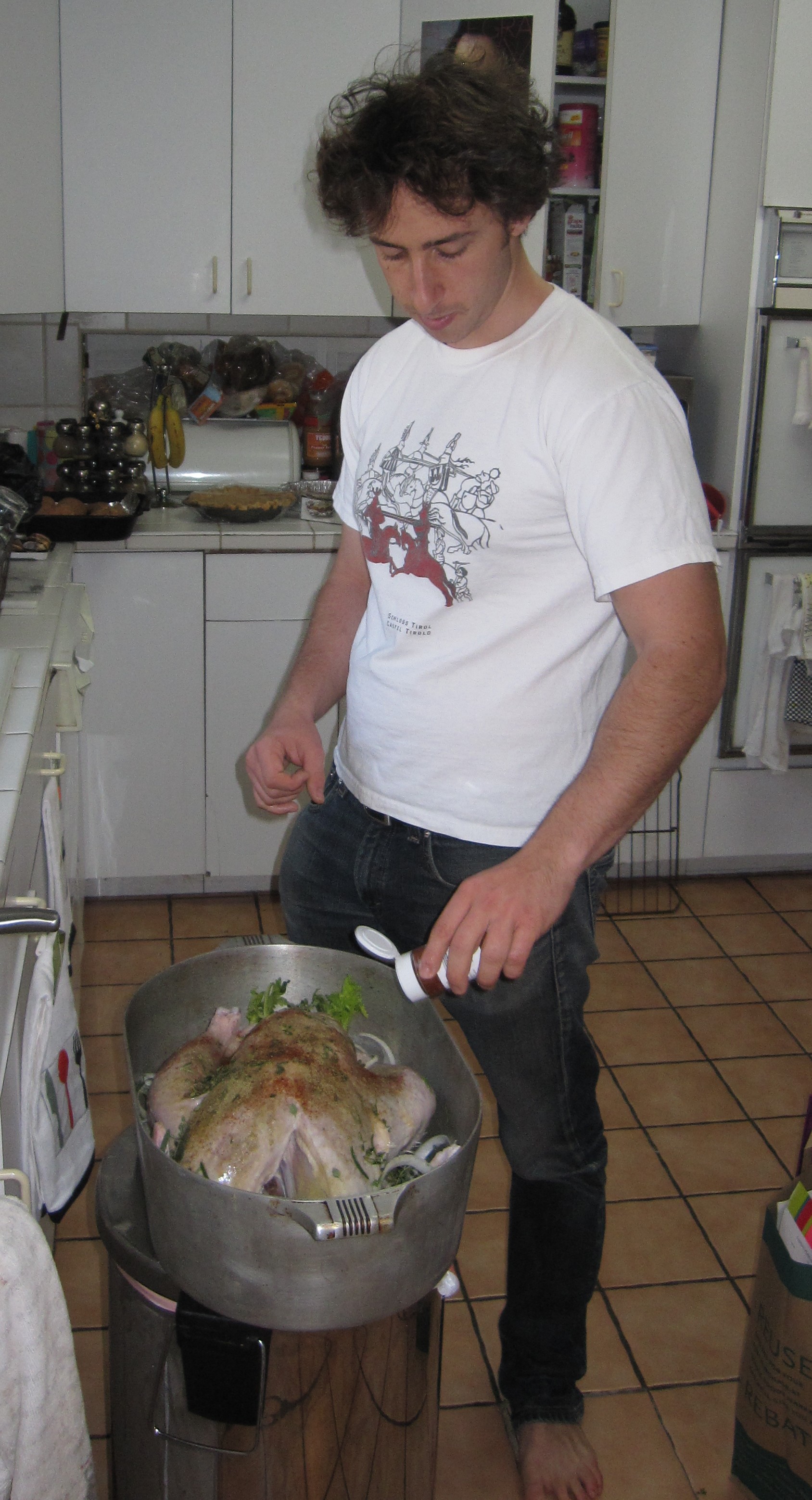
He now admits that he’s never roasted a turkey and has no idea how to make stuffing, other than from
a bag or box. (I’m a real cook; I bought bread and fresh herbs, celery and mushrooms instead.) I’m going to tell
him how to do it all, but do my best to keep my vow and let him do all of the cooking. Why shouldn’t he get what he
wants?
As you know if you read this blog regularly, under normal circumstances I somehow manage to always mess things
up with my kids. But nothing is quite normal this year, so perhaps there’s a small chance -- a chance that I’ll
actually control my need to be in control all the time, and give him free rein in the kitchen. Here’s a headline for
the evening news: "Nice Jewish Mom Keeps Calm."
I think I can. I
think I can! All I need is some self-restraint. No. Wait! All you need is love. Just ask George. And John, Paul,
Ringo and Abbey. Actually, I’d love to be a guest for once at Thanksgiving dinner. Maybe I’ll even let him carve.
Thursday, November 17, 2011
A Word From the Weiss
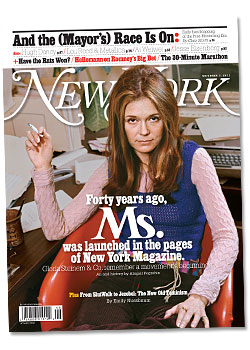 All work and no play, they say, makes Jack a dull boy. But what about all work and no pay? Or, for that matter,
low pay? Also, given the vestigially sexist vagaries of our society, in which 40 years after the founding
of Ms. Magazine women still earn only 77.4 percent as much as men -- and many of them still content themselves
with house and volunteer work while their husbands bring home the bacon (or, for those who keep kosher, the bagels) -- what
if we’re not talking about Jack, but Judy, Jessica or Jill? All work and no play, they say, makes Jack a dull boy. But what about all work and no pay? Or, for that matter,
low pay? Also, given the vestigially sexist vagaries of our society, in which 40 years after the founding
of Ms. Magazine women still earn only 77.4 percent as much as men -- and many of them still content themselves
with house and volunteer work while their husbands bring home the bacon (or, for those who keep kosher, the bagels) -- what
if we’re not talking about Jack, but Judy, Jessica or Jill?
These are all issues that I grappled with over
the past week, as my daughter and I both struggled to find meaning, purpose, and some semblance of self-worth at work.
It all started a couple of weeks ago, when Allegra called excitedly to say that she’d heard about a job opening
at a popular movie theater in New York. Her friend Teale had worked at the Angelika Film Center, a hip venue in Soho that
specializes in independent films, and she'd mentioned that they were hiring and that she easily could get Allegra an interview.
Since moving to New York in August, Allegra had managed to land gratifying work teaching human rights to
high school freshmen at an after-school program in Harlem. The class, however, met only twice a week, and the job was an unpaid
internship. Although she'd graduated in May from a rigorous music conservatory with the aim of singing jazz professionally,
she had yet to find any employment that might pay the rent, or at least some portion of it. The Angelika job sounded like
it was heaven-sent.
Until she phoned us a few days later, following her interview, that is.
The position, it turned out, did not involve manning the ticket booth. Rather, she’d be working behind the concession
stand and cleaning the various theaters between showings. Her shifts would start at 4 or 5 p.m. and run till midnight and
beyond. Plus, the place paid only minimum wage. I assumed this was $9 or $10 an hour. She said it was $7.25.
Most people are pleased, even thrilled,
when their children find paid work. But I am not most people. I'm NiceJewishMom.com.
“Are you crazy?!!!” I asked her. “I mean, seriously. You’re going to clean up people’s spilled
popcorn, candy and soda, and only make a pittance?”
It wasn’t as if this job were the bottom rung in her chosen field and might lead to some better position.
Rather, it was more likely to hinder her in her career. What if she were offered a singing gig in a restaurant some
night and had to turn it down in order to be what was essentially a janitor in a movie theater… for $7.25 an hour?
I expected that she would appreciate my not wanting her to demean and exhaust herself with such menial and poorly paid
labor. So I was bewildered when she seemed deeply offended instead. “Don’t worry, they probably won’t hire
me anyway!” she retorted with clear hostility. Later that night, her father and I received an email
explaining why.
“Finance,” read the subject line. And as missives to Mom and Dad go, it was rather formal.
“I'm
really so sorry about this afternoon,” it began. “I did not mean to get so upset, but there is so much going on
in my life, and I am extremely unsure of some very important things that should have been established between us from the
beginning.” Specifically, she was confused about the issue of financial support. “Can you clarify some things
for me?”
Her aim
had been to become financially independent upon moving to NYC “so you would not continue to be burdened by me,”
she wrote. I presumably supported this notion, since I had proceeded to barrage her with job postings I’d found on Craig’s
List. Even so, when she’d landed her unpaid internship teaching in Harlem, I’d encouraged her, then written a
blog noting how proud I was of her for undertaking such noble work.
“You guys have always been very supportive,” she stated.
But it had never been made clear how long our subsidies might continue. “What is the actual plan here?”
She had applied to the Angelika "because I've been living under
the assumption that you guys don't want to support me for as long as it may take to get my career going,” she said.
“I thought I should get it to make some progress toward financial independence.” But as soon as she'd gone
for an interview, we'd dismissed the idea, deeming it silly to do a minimum-wage job leading nowhere.
“I would like to know what you actually want
me to do here," she said. "Is the agreement that you will support me financially while I get my record together
and try to become an established musician in NYC?” Would we continue to support her until January? Until next week?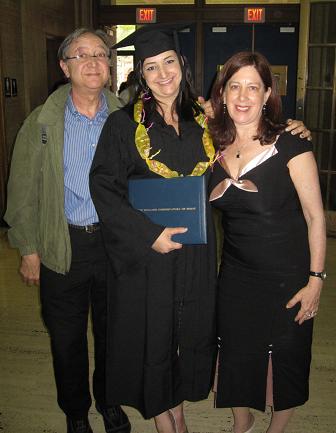
“If
I should be trying to pay my own rent, or earning my own spending money, then I have to take the job, any job!” she
wrote. However, she hesitated to get stuck in a “real job,” which might sap so much time and energy that she would
never be able to realize her dreams to be a performer.
“I am so lucky to have had the full and never-ending support
thus far from you both,” she wrote. “But when money is involved, it is always best to be clear. What is a reasonable
and good plan? Before I take or turn down this job (possibly tomorrow), I would like to be completely in the know, so
I can make a more informed decision and a better road map of my life.”
It was a mature and well-reasoned entreaty, and I
wanted to give her some answers. But I also didn’t want to get into a screaming match. So I asked my husband to
call her, although I told him what I wanted him to say. (Isn't that the Jewish mother's way?)
We did support her musical ambitions. We believed
in her and intended to stake her for as long as it might take. And that’s why there was no real plan.
Her
future was so unpredictable that we preferred to leave things open-ended. No, we weren't intending to support her forever.
But we were far from ready to set some arbitrary expiration date for our parental largesse.
Even
so, I had assumed that she would feel better about herself if she had a part-time job that would yield some spending money.
Only the week before, she had phoned from the supermarket to say that she had a craving for red meat, but all the steaks were
prohibitively pricey. Then she’d proceeded to walk through the meat aisle, reciting the costs of everything from New
York strip to chuck. (I must confess that I'd persuaded her to buy chopped sirloin and have a burger instead.)
Wouldn’t she like to have some cash to
call her own, so she could stake her own desire for steak and maybe spring for Porterhouse instead of ground round?
As for the Angelika, we preferred that she seek a
"day job" that actually took place during the day, so she’d be free to sing at night. Then again, if they
hired her, perhaps she should give it a try. If she didn’t like it, she could always quit.
Somehow, all of this got conveyed amicably enough
by Nice Jewish Dad that we went into the city to visit Allegra that weekend. And when by chance we found ourselves
walking right by the theater, I went inside to check out the scene.
This
place looked so cutting edge that I began to reconsider my stance. There was a long line of hip customers extending from the
box office, even in the middle of the day. Stylish young people were wandering in and out, ogling posters for upcoming attractions
like Marcy Martha May Marlene and Melancholia, starring Kirsten Dunst. As I would later read on its Web site, this
ultra-cool place was “the definitive cinema
of choice for filmmakers and film lovers alike... the most successful and recognized arthouse in the United States.”
The
only problem I could see was that the chic concession stand was stocked, not with the usual boxes of Raisinettes and
Goobers, but trendy-looking baked goods and oversized Rice Krispie treats that looked irresistible. I couldn’t look
at those for hours without downing one and wrecking my diet. But otherwise, who wouldn’t want to work here?
When
I admitted this, Allegra looked a little sad not to have heard anything following the interview.
No matter. She got the call a few days later.
The job was hers. She started
last Friday.
This
news came in at around the same time as I got word about some work myself.
Every
year, as I’ve noted before, I write the lyrics for our temple’s annual Purim spiel. I choose some popular Broadway
musical and rewrite eight or nine songs so that they convey the story told in the Megillah about brave Queen Esther saving
the Jews from the deadly schemes of the king’s wicked henchman, Haman. Thus, West Side Story became “Est
Side Story,” The Lion King became “The Zion Queen,” and The Buddy Holly Story was reborn
last year as “The Bubbeh Challah Story.” (Want a sample? See “There is No One Like the Jews,”
from “South Pers-cific,” which you can easily find on my site’s navigation bar.)
During
the past 10 years, the senior rabbi at our shul has narrated the ancient tale during the spiel while a cast of congregants
has performed my reworked songs. Last summer, however, the rabbi left to take the helm of a world organization
in Israel. The former assistant rabbi, who succeeded him, has no desire to perform in the production. So someone needed
to write a prepared script to take the place of the rabbi's narrative. Earlier this fall, the cantor suggested that
this person be me.
As flattered and eager to help as I was to help, I admitted that this effort would prove extremely taxing,
given my many other commitments, including this blog. I also confessed that as much as I enjoyed writing the lyrics, a
script sounded like real work. Over the past decade, I had never asked for nor expected any sort of compensation for
my songs, even though most temples buy them to the tune of several hundred dollars. I had also spent months each year
rehearsing the production, in which I always appear, as well as making the program, ordering T-shirts for the cast, and so
on. So I humbly asked if, just this once, I might be paid in some way for writing a script.
Realizing
that our temple is always strapped for funds, I tried to get creative. If there were no money earmarked for such purposes,
might my family get a small reduction in our $2,500 annual dues instead, just for this one year?
The cantor had readily agreed that this was a reasonable
request and had vowed to take it up with the temple president. But then I’d heard nothing for nearly a month. Until
last Thursday afternoon, when she wrote to report the verdict.
She said she had consulted the powers-that-be, and they felt that
this was impossible. It was not because they didn’t value my artistry, which they did, nor because they didn’t
appreciate the amount of work I'd be doing (“which you will!).” The problem was that they didn't want to set the
precedent of paying volunteers.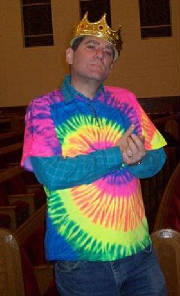
“As you can appreciate, we have many people who do
a tremendous amount of work for the temple, including yourself, who go above and beyond all expectations of the community
and for which we are extremely grateful,” she wrote. She realized that she had approached me to do the work and said that
she'd completely understand if I wanted to rethink the commitment. "If we can have
you in the capacity of writing lyrics and appearing in the spiel – Dayeinu – that will be more than enough!”
I read her words once. I read them twice. And I suddenly felt sick at heart.
Over the past few years, I’ve
insisted that I don’t mind not receiving financial compensation of any kind for anything I do, including writing this
blog each week. Never mind that I’ve spent decades at various publications as a professional journalist. When you’re
paid to write for print, you have to limit yourself to subjects that an editor assigns or accepts, cut your words to fit limited
space, and submit to editing choices that you may not welcome at all. You are hardly your own boss. I would far prefer, I
keep telling myself and others, to have total artistic freedom. I’m happy to have an outlet for self-expression... and,
of course, readers like you.
When it came to Purim, I've never expected anything in return for the writing. It was a privilege to have a ready-made
theatrical company willing to rehearse my lyrics for months, not to mention a sizable audience, both young and old, who
invariably showed up to see the spiel. Best of all was the gratifying sense that what I’d created meant something in
all of these people’s lives. For the performers, it was a chance to feel like a Broadway star for a day and dazzle their
family and friends. For the onlookers, it was not just a brief source of entertainment, but a positive and uplifting Jewish
experience. (It seems to me that other religions are always celebrating, while we’re just davening and suffering.
On Purim, Jews just get to have fun.)
Writing a script, though, sounded like an arduous task, far beyond the time and effort
I have long donated gladly. Also, in order to fit this extra assignment in, I would probably need to disappoint my blog
readers for at least a couple of weeks... if I could wheedle some time off from the world’s worst boss – myself.
Then I began to think about how long it had been since I’ve actually been paid to do anything. After I left
my most recent regular job in journalism, nearly 16 years ago, I did a fair amount of free-lance writing for publications
such as The New York Times and Good Housekeeping.
I also spent two years as the faculty advisor to
a high school newspaper, for which I was paid a small honorarium, and coached girls’ soccer teams for eight seasons,
obviously free of charge.
My life has been dominated, though, by being Nice Jewish Mom (i.e. taking care of my family),
for which I have never expected anything
in return… other than that, with luck, my children will grow up to be people I admire and who will call me now and
then. So I guess so far, so good.
But having spent decades working for pay, I have a lingering sense, however sensible it may be, that in order to feel
like you're worth something you must be paid to do something. And one good measure of your worth is how much you are paid.
So, extrapolating from that idea, what is my daughter Allegra worth – the $7.25 an hour they're willing to pay
her at the Angelika? Or the $300 she got two weeks ago to sing for four hours at a private party in a fancy hotel ($75 an
hour)? Or is she worth what she means to me (everything!!!!!)?
And if I can see that, then why can’t I make
myself feel like I’m worth anything (or everything) just because I’m willing to do anything and everything for
almost anyone… for nothing!!!!!
With that thought in mind, I wrote back to the cantor that I would need to give the matter
further thought, then headed off with my husband to visit some old friends on Martha’s Vineyard.
These two people are not just very good friends, but also very good artists. Jay Lagemann, a college classmate of my
husband’s, was known at Princeton as a math genius, then went on to earn a Ph.D in Mathematical Logic
from M.I.T. But the greatest evidence of genius, perhaps, is that he’s barely worked a day in his life.
For as long as I’ve known him,
which is nearly 30 years, he has lived in Chilmark, on the Vineyard, on 9 acres that his parents purchased decades ago. He
has built several houses on that land with his own hands, including the large grey shingled one he lives in now that actually
features an indoor pool.
It always amazed and mystified me that he refrained from ever taking an actual job (other than a stint years ago working
on the special effects crew for the movie Jaws 2), and seemed to fill his days doing whatever his mood dictated,
more often than not wind-surfing. But he’d taken every art course available at Princeton, and about 18 years ago suddenly
reinvented himself as a proficient sculptor, churning out countless works with such skill and whimsy that he quickly developed
a following and widespread local fame.
Jay may be best known on the Vineyard for his public monument Swordfish Harpooner, installed on Menemsha Beach
in 1994 in honor of Chilmark’s Tricentennial. But most of his other works are of a nature that is less nautical than
slightly naughty (such as the one he gave my husband for his 60th birthday of a dog lifting his leg).
Then again, some are just nice, like
his large metal sculpture Swinging Jenny, featuring a man in red holding up a little girl in yellow, an edition of which we
bought at least 15 years ago for a greatly reduced "friends'" rate that he now tells us sells for $12,000.
Jay’s sculptures may command prices like that, but he turns them out so prolifically that many simply adorn his
property, making for what he refers to as his Wild Island Sculpture Garden. So even if he lives rent-free, it probably helps
that he met Marianne.
It was my husband, in fact, who introduced them in 1975, although he readily admits that at
the time he was merely thinking along the lines of date, not soul mate. Jay, after all, was a free-spirited ladies man and
confirmed bachelor. Marianne was the divorced and devoted mother of twin 5-year-old girls. But something ignited instantly
between them, and after nearly 37 years together they are the devoted grandparents of 6.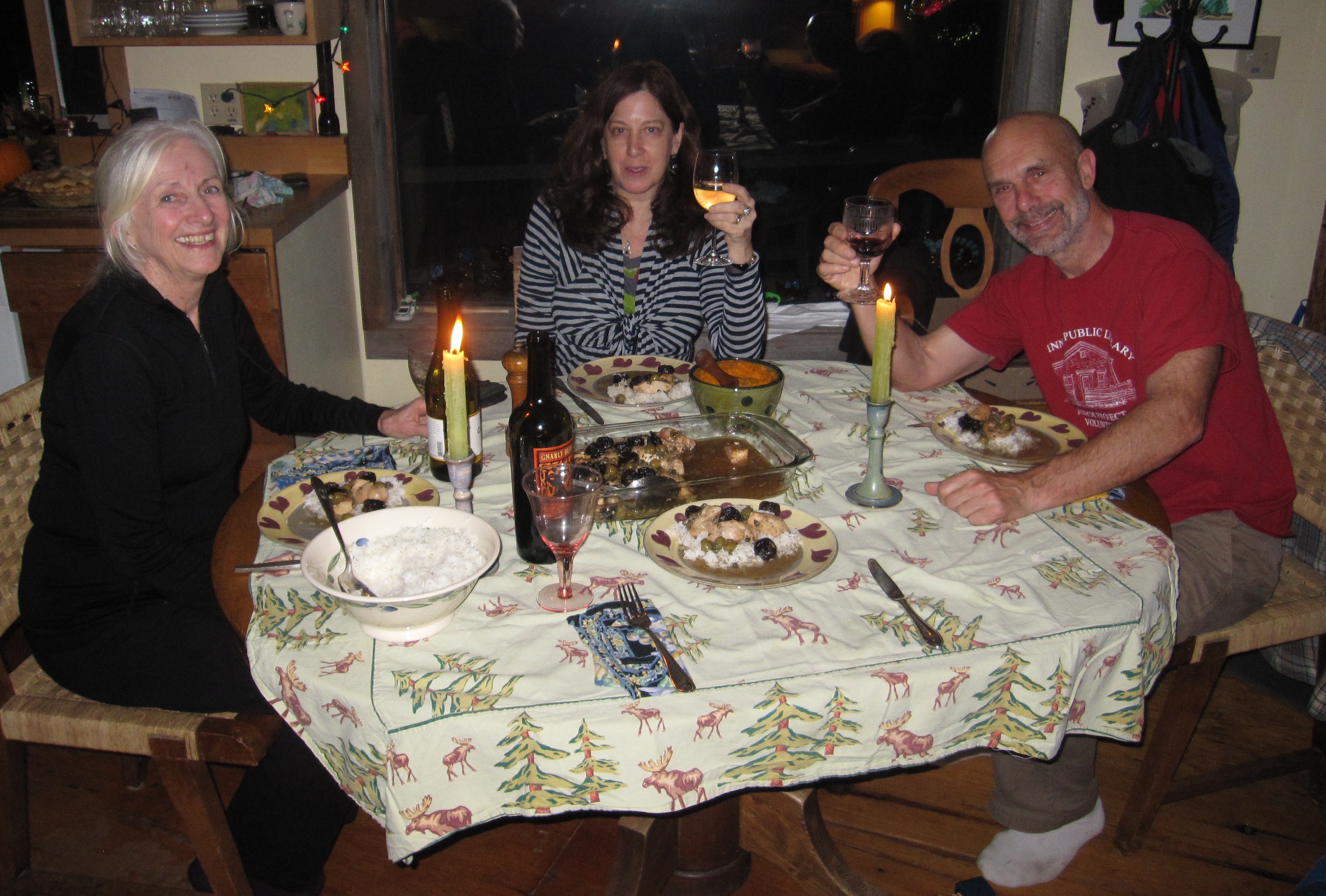
As it happens, when Marianne’s gorgeous twins, Chris and Jenny, grew up and married, Jenny decided to move in
right next door, then gave birth to a son and twin girls herself. And up until the girls started school last year, Marianne
took care of them daily while Jenny worked as an art teacher and her husband Todd worked for the town.
At one point, for many years, Marianne ran a thriving and lucrative business that printed all those Black Dog t-shirts
and sweatshirts that people buy at the Vineyard’s famous Black Dog Bakery. But she closed the company a few years ago
after losing that account and was happy to spend several years supervising her grandchildren all day – gratis, of course.
She’s always been an avid painter on the side, though, and now that the kids are all at school she has more time to
devote to her artwork. She specializes in tranquil seascapes, landscapes and still lifes, mostly featuring floral compositions
or bucolic scenes around the Vineyard, executed in pastel shades done on paper with gouache, a form of opaque watercolor.
The last time we visited, we bought one, although it was almost impossible to choose just one. And while visiting last weekend,
we went to a show of her work at the local library, where each delicate piece was so exquisite that it was impossible to select
a favorite.
Although Marianne’s paintings are priced at $300 apiece, she admits that she sells them mostly to friends, so that her studio is overflowing with a vast
inventory of work. This doesn’t discourage her from continuing to create more, though. Rather, she gets together with
a group of artist friends several times a week, to support each other, socialize, and often to paint their own versions
of the same still life all at once. are priced at $300 apiece, she admits that she sells them mostly to friends, so that her studio is overflowing with a vast
inventory of work. This doesn’t discourage her from continuing to create more, though. Rather, she gets together with
a group of artist friends several times a week, to support each other, socialize, and often to paint their own versions
of the same still life all at once.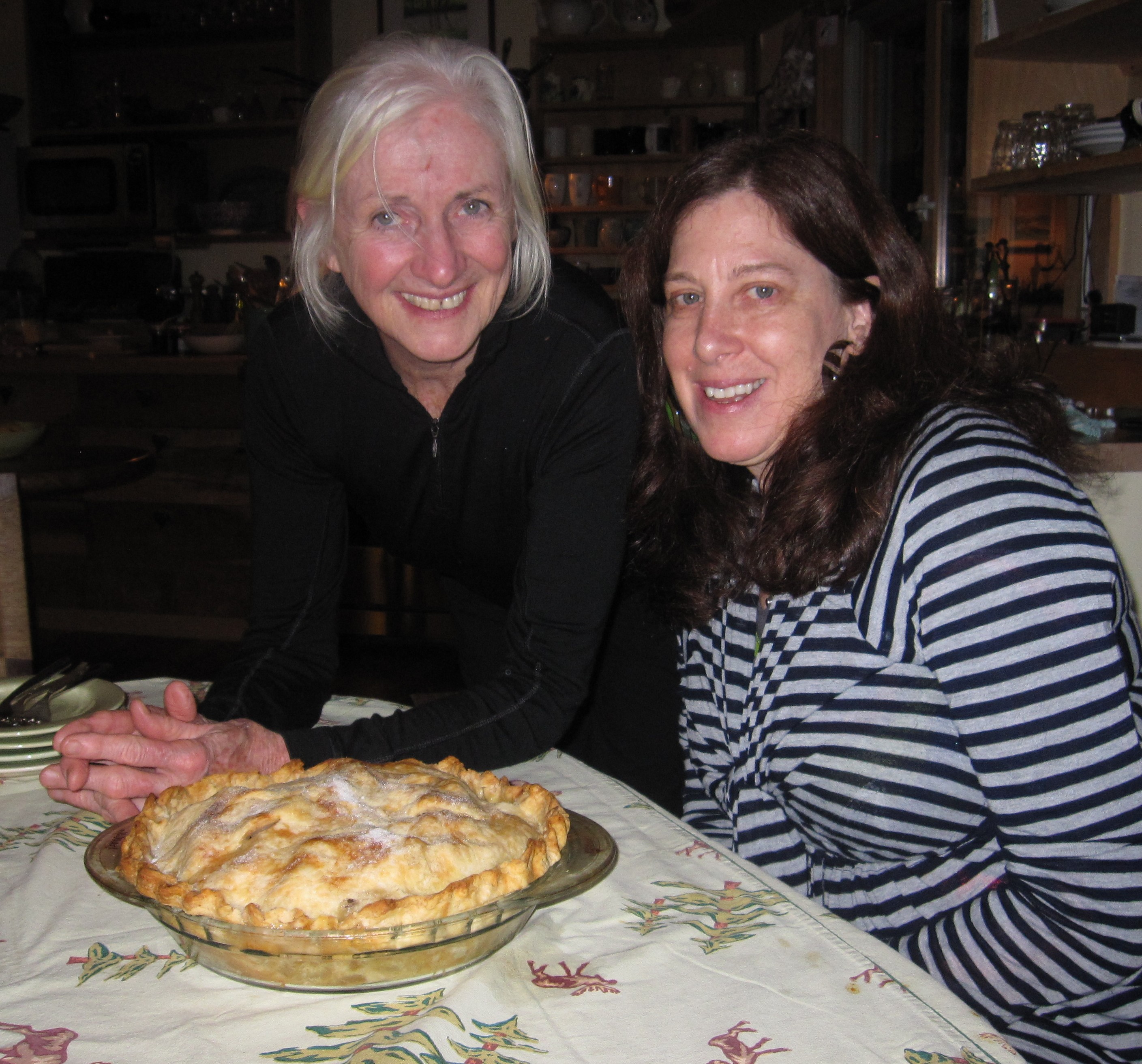
She also is an extraordinary cook, and while we were there she made an incredible dinner of Chicken Marbella and a luscious
puree of butternut squash and carrots seasoned with ginger, coriander and thyme. Her greatest artistry, though, perhaps, is
in her skill as a baker. Her apple pies, made with homemade canola oil crust, are priceless.
If you really want to talk about priceless, though, you need to meet those children. They say it takes a village to
raise a child, but after spending a weekend with Dashiell, who is 10, and twins Elle (short for Eloise) and Wren (short for
Adrienne), I’d argue that all that it really takes are two great parents, plus two grandparents living right next door.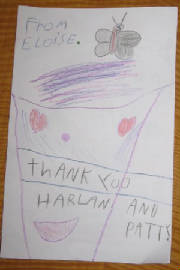
When we arrived with small gifts for each of the kids they not only reacted with clear gratitude and delight, but also
showed up a few hours later with gorgeous handmade thank-you notes that they had taken the time to draw and write.
Their parents, meanwhile, Jenny and Todd, insisted on bestowing on us a bag of delectable decaf from the fledgling coffee-roasting
business they have opened, Chilmark Coffee Company. Nice!

Then we all took a walk together on Lucy Vincent Beach, cavorting in the sand yet avoiding the frothy tendrils of the
roiling surf, since it was mid-November and decidedly chilly in charming Chilmark. 
So, if being paid is what validates work, then should Jay limit himself to producing only sculptures that he can sell? Should
Marianne only paint (or bake) for profit? And how can she begin to put a value on her own worth or the major role she has
played in raising two generations of unquestionable mensches?
Meanwhile, dispatches continued to pour in by text and forlorn phone calls from Allegra day and night (mostly
night), back at the Angelika theater.
On Friday, she worked till midnight.
She had nothing but popcorn for dinner. The customers were relentlessly impatient and rude. And as bad as it might have been
cleaning up spilled candy, soda and popcorn, she learned that the hip, young patrons managed to sneak in beer and spill that
almost everywhere, too.
The janitors had yelled at her because she was supposed to sweep up the spilled popcorn with a broom, which
was hard to wield on carpeting, and she wasn’t doing it fast enough.
It also turned out that along with cleaning
the theaters between showings and working behind the concession stand, she was expected to clean the bathrooms.
“The people are nice,” she
conceded. But her feet hurt after eight hours. “That was awful,” she wrote.
 On Saturday, they kept her till 1 a.m.
A friend came in to surprise her and laughed aloud at the sight of the uniform and baseball cap she was required to wear.
She also discovered that this hotspot was a mecca for celebrities, including David Schwimmer, Ed Norton and Julia Stiles,
as well as Amanda Seyfried of Big Love and Mamma Mia!, who helped her sweep up some popcorn, thinking it
was funny because she’d never used a broom before. On Saturday, they kept her till 1 a.m.
A friend came in to surprise her and laughed aloud at the sight of the uniform and baseball cap she was required to wear.
She also discovered that this hotspot was a mecca for celebrities, including David Schwimmer, Ed Norton and Julia Stiles,
as well as Amanda Seyfried of Big Love and Mamma Mia!, who helped her sweep up some popcorn, thinking it
was funny because she’d never used a broom before.
But A-list patrons have expensive tastes, and not necessarily the good manners to go with them. Along with spilling
the usual refreshments, someone had snuck in a lobster dinner and dropped the shells all over the floor, along with spilling
champagne. “It was gross,” she said. And they kept her until 1:30 a.m.
By Monday night, she was ready to throw
in the towel. In fact, she actually tried to quit. But her boss begged her not to, saying they really needed her and to think
it over.
Of course, I was proud in some ways to have a daughter who was willing to suck it up and work like a coolie for peanuts (although
she assured me that the bathroom duty did not include scrubbing toilets). On the other hand, as her Mom-ager,
I was tempted to phone this man who wouldn’t accept her resignation and try to set him straight. “Let me explain
something,” I imagined saying. “My daughter is a Jewish girl. She’ll work the box office, but she’s
not going to be cleaning any bathrooms. She’ll pick up popcorn if you get her an Electrolux; none of this using a broom
on the carpet business. You need to raise her salary. A lot. And that uniform? Very unflattering. The cap has got to go!”
That night, though, they gave her a better shift. She got off at 11. They also let her work the box office for the first
time. Plus she learned that she got to see movies for free and took my son to see Melancholia before she began work
that afternoon. “I half quit,” she wrote that night (whatever that meant). “They gave me the weekend off
to decide if I want to come back.”
“You don’t!” I replied. But my son called me the next morning to voice a dissenting opinion. And it
had nothing to do with free movie passes. Nor the fact that he has put in his share of doing menial tasks in
the past three years, albeit for handsome pay and in his career field of choice.
"We can’t let Allegra quit!” he declared.
Despite her professed misery, he said that to his eye she was happier than she’d been in months. She was around
other people and making friends. She was keeping busy – too busy to sit around missing her boyfriend, who moved to L.A
for a job last month. Best of all, perhaps, her life had structure for the first time since she'd graduated college last May.
And all of those things were invaluable, or certainly worth working for $7.25 an hour.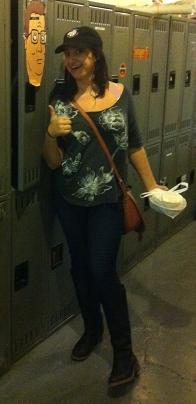
That afternoon, I got a call from the cantor. I told her that I was a little disappointed about the president's decision
and about having to work way above and beyond my usual duties for nothing. But I told her that she could count on me. Of course
I would write both the lyrics and the Purim script.
After all, when I slice
up the roasted Butterball (oops, make that the Empire Kosher turkey) this Thursday, I'm really going to be giving thanks for
all the people I have in my life, and all of the things I get to give, not how much or little I may earn.
And if I actually feel worthless
without earning money, then maybe I need to find some magazine or other publication that will pay me to write something, whether
it’s something that I want to write or not. But I’d be better off re-examining the superficial, simple-minded and
outright erroneous notion that either society or the open market gets to decide what anyone is worth.
Is A-Rod really worth $32 million, while
a great teacher is only valued at perhaps a thousandth as much? Are corporate CEOs really worth their multi-million-dollar
salaries plus those obscene bonuses? Are women worth only 77.4 percent as much as men? And are artists, or mothers or grandmothers
who stay home to raise the kids, worth nothing at all?
At least at the temple I’ll get to write whatever I want (well, within reason), and get the great satisfaction
of knowing that some people will really, truly appreciate my efforts.
I’m also fairly certain I won’t have
to clean up lobster shells. And that’s worth a lot.
3:17 pm
Wednesday, November 9, 2011
A Word From the Weiss
 They say that whatever goes up must come down, and that all good things must come
to an end. I’m not sure the latter is true – unless those good things are extremely expensive. They say that whatever goes up must come down, and that all good things must come
to an end. I’m not sure the latter is true – unless those good things are extremely expensive.
When I last left you, a week ago,
I was feeling remarkably lucky yet a little abashed to be ensconced in a comfortable hotel, due to a massive power outage
caused by an unseasonably early snowstorm in Connecticut. It felt awfully good to be warm, or at least a whole lot better
than it would have felt to be living in a dark house that was around 40 degrees inside. Yet the arrangement was too costly
to keep up for long. So after two cozy nights and one last hot shower, we checked out of the hotel, and like a character in
a John le Carré thriller (only with a little less action
and a lot more angst), I became The Nice Jewish Mom Who Returned to the Cold.
I had little confidence in the assurances of our utility company, Connecticut Light & Power, that 99
percent of all customers would have service fully restored by midnight on Sunday. Yet my soul felt nearly 99 restored after
that brief sojourn back in civilization. Besides, we’d long been scheduled to spend Saturday night in NYC, where we’d
visit both our kids and attend a Broadway play. I figured that we could easily endure two more nights of misery in the interim
before getting another respite from refrigeration.
 Since misery loves company, we
readily accepted a dinner invitation for Thursday night from our good friend and neighbor Liz, who was also without power,
but unlike us had one major advantage – a working gas stove. How comfy it was to huddle in her living room before a
roaring fire, sipping a nice cabernet. Yet I kept getting up to help because it was no easy feat for her to assemble a meal
in the dark, made harder still by her having twisted her ankle earlier that day while running up the stairs in the dark. Since misery loves company, we
readily accepted a dinner invitation for Thursday night from our good friend and neighbor Liz, who was also without power,
but unlike us had one major advantage – a working gas stove. How comfy it was to huddle in her living room before a
roaring fire, sipping a nice cabernet. Yet I kept getting up to help because it was no easy feat for her to assemble a meal
in the dark, made harder still by her having twisted her ankle earlier that day while running up the stairs in the dark.
Neither did it help that, unlike us, she had a working, old-fashioned land line, and her phone kept
ringing throughout the evening with various emergency messages. First came the daily update from the mayor, reporting on the
status of repairs (very slow) and announcing that the National Guard had now been called in to help with the cleanup. (At
least there are some perks to having your area in an official state of emergency.) This was soon followed by a call from
the police alerting residents that there was a person of interest in a possible murder on the loose, and that he was considered
dangerous.
Now, in case you’re wondering, I live in a perfectly normal suburban neighborhood. A nice, tranquil,
and predominantly Jewish neighborhood. And in the nearly 30 years that I’ve been in this town, never once had I
received a telephone alert about a possible murder. (The worst crisis I could remember was on Passover two years ago, when
local stores ran out of regular matzah, and only whole wheat or onion-flavored were available.)
It also seemed that in the middle of a major power outage, the last thing anyone needed was to have a dangerous criminal
at large. But fortunately, Liz soon hobbled to the phone one more time, then announced that the suspect had been apprehended.
We might not be snug in our beds that night, but at least we would be safe.
The next day, Friday, my husband miraculously managed to find a licensed electrician who was willing to come
over and hook up our generator to our fuse box in the basement. I was beside myself with joy that we might actually have some
heat. Still, it was a little unnerving to spend the entire day confined to a freezing cold house awaiting his arrival, and
then to make the series of unbearable choices that he posed to me.
For example, with local stores depleted of equipment,
he only had enough power cords to hook up the refrigerator and one of our home’s two furnaces. Did I want to have heat
on the main floor, including the kitchen and living room, or leave those rooms icy cold and heat the upstairs bedrooms instead?
We already were getting used to keeping our coats and hats on indoors while we were awake. Eenie, meenie, miney... moan. Whatever.
Bedrooms, I said.
Then there was the issue of how to run those power cords into the house from the generator, which had to
remain outdoors. He could snake them through a cellar window, which would then remain open and leave the basement drafty all
winter. Or he could drill a hole through the house large enough to fit three power cords, as well as assorted small animals
that would probably start crawling through it too – mice, squirrels, rats (rats?!?!!!!) and maybe a possum or two, although
presumably no lions, tigers or bears.
I mean, seriously. What kind of a choice was that? Wouldn’t we be
better off just staying cold until the power returned? He demanded an immediate answer, though, and he was being paid by the
hour. So I settled for the drilled hole and suggested that he plug it up with enough insulation so that perhaps only insects
and very small rodents could enter.
Since I was confined to the house until nearly 5 p.m. that day, I was unable to attend to one crucial
task. Having had no Internet all week while my husband was able to connect at his office, I had entrusted him to make
hotel reservations in the city for the coming weekend. Normally, I take charge of all such arrangements myself. Men, if you
ask me, don’t have the patience to do it, or at least the patience to do it the way I do it – by checking
multiple online sites like Hotels.com and Hotwire, then comparing their prices to the various hotels’ own Web sites,
all the while reading countless customer reviews to make sure that you don’t end up in a place that’s dirty.
Or smells bad.
Compounding the problem was that this was the weekend of the New York City Marathon, meaning that everything
remotely affordable was already booked. There was nothing within Manhattan for under $300, including taxes. And I do mean
nothing. So I’d given my husband the go-ahead to consider other boroughs and maybe even other countries. Like
New Jersey. In response, he’d booked two options, a Days Inn in the Bronx and a Clarion in Queens. I’d been planning
to check them both out online that day before cancelling one. Now I was forced to choose sight unseen. I phoned the Bronx
hotel first and learned it was 11 miles from midtown. So I cancelled and decided to go with Queens. It had to be closer than
that.
Besides, we’d have to drive through Queens to reach our daughter’s sublet on Roosevelt Island
anyway. Ever since the weather had turned unseasonably cold (cold enough to prompt that snowstorm that was not just premature,
but pre-Halloween), Allegra had been counting the days until I could bring down her arsenal of warm coats, hats, gloves, and
scarves to ward off the wintry chill.
We left for New York the next morning, and while I drove my husband
read the newspaper. To our enormous distress, we discovered that the murderer apprehended on Thursday night had not been a
crazed maniac after all, but a member of our son’s high school class, who had brutally stabbed his estranged girlfriend
when she'd refused to join him on a trip. The victim had also attended our kids’ school, in fact, but had been in the
class ahead of Allegra’s. And to my great relief, neither name sounded at all familiar.
I was excited about getting to see both of our children, but also filled with trepidation. Our plan was not
only to visit with them, but to have them join us for dinner and the play that night.
Regular readers of this space will no doubt remember the last time we prevailed upon our son to accompany
us to the theater, only a few weeks ago. I’d purchased Aidan a ticket to Relatively Speaking, a series of comic
one-acts by Ethan Coen, Elaine May and Woody Allen, without asking him first, only to discover that his busy life was so stressful
that he exploded at me when I arrived, sounding so ferocious that I burst into tears just as the curtain went up.
Then there was the mother-daughter weekend earlier this fall that had ended abruptly with a gut-wrenching, vituperative
screaming match between Allegra and me. After these unsettling experiences, my husband and I had agreed to leave our children
out of our social excursions for awhile and keep our impassioned mutual love of theater to ourselves.
Just as misery loves company, though,
so does joy. So late last summer, when I’d read that a play we were dying to see was opening on Broadway this month,
I’d snapped up four tickets instead of two. This production was expected to be so phenomenal, I figured, that we would
easily be able to convince another couple to join us.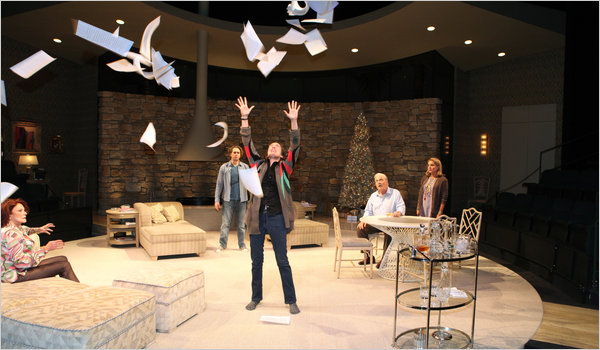
After all, when it had originally opened at Lincoln Center last January, Ben Brantley had hailed this
show in The New York Times as “the most richly enjoyable new play for grownups that New York has known
in many a season.”
According to his review, Other Desert Cities,
by Jon Robin Baitz, was a “gorgeously acted” production, not to mention that it brought to mind “the kind
of plays New York audiences regularly enjoyed from the 1920s to the ‘50s: literate, thoughtful, well-tailored topical
dramas in which people spoke with a fluency, wittiness and sense of timing we only wished we could command in real life.”
After that write-up, it had sold out instantly, and tickets had been unavailable until it had relocated to Broadway with an
equally stellar all-star cast, including Stockard Channing, Stacy Keach, and Judith Light. Now, who wouldn’t want to
see that?
Somehow, we had failed to line another couple up, even so, and recently Allegra had expressed interest in seeing
it, especially if Aidan came too. Besides, the play was said to be not only both hilarious and poignant, but also about a
dysfunctional family. Our own foursome is surely as dysfunctional as any. So seeing it sounded like a family affair.
I remained anxious, though, because I was schlepping in a whole lot of stuff for Allegra. While searching
in her closet and drawers for her winter wear, I’d come across countless sweaters, heavy pajamas and other items that
I thought might come in handy too. (Better to bring in the old than risk having her shop for the new.) I also was toting
assorted small gifts I’d collected since I’d seen her last. I assumed that anything she didn’t want could
easily be sent back home. But I worried that when I descended on her already cramped bedroom with a trunk full of junk, she
might be irritated, even irate.
On the contrary, she seemed thrilled to see us and delighted by all of my offerings.
As she sifted through the bags, she exclaimed repeatedly, “Oh, I really need that!” And every time she opened
one of my gifts, from the eight-quart stockpot in which to make homemade chicken soup to a sequined black top which seemed
perfect for her jazz singing performances, she raced to show them off to her roommates, crying, “Look what my mom brought!”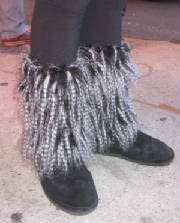
She even appreciated the funky fake fur boot toppers I’d brought, designed to make any ordinary pair
of boots look like wooley mammoth gams... and/or a fluffy, fashionista’s dream come true.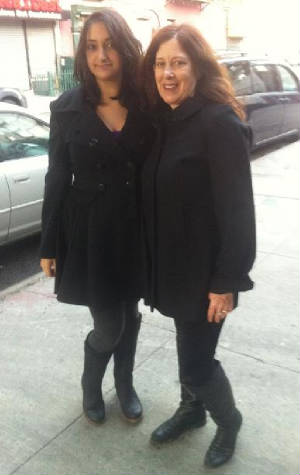
The three of us proceeded to have a lively afternoon wandering around SoHo, shopping and visiting with friends
from home. Even Aidan sounded like he was in good spirits when he called to suggest meeting and eating at a Japanese restaurant
he liked before the play. He was grateful when I suggested that his good friend Kris join us for dinner. Then, unlike last
time, I managed to show up right on schedule. What could possibly go wrong?
The miso soup and salads had been
cleared and our assorted entrees had just arrived when I remembered the latest news from home. Believe it or not, I said,
someone from Aidan's high school class apparently had killed someone just two nights earlier. But I was fairly certain
it was someone he didn’t know. And, indeed, the name failed to ring a bell.
The kids then asked who the victim
had been, and only at that moment did it occur to me that my daughter had been a class behind the girl and might recognize
her name.
My husband could only remember her last name, though. Berrincha. I’m not sure he even pronounced it
correctly. But Allegra’s face instantly contorted in horror, and she began to shriek in obvious disbelief. “Suzete?”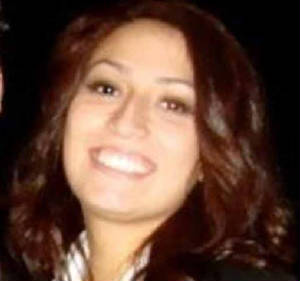 she cried. she cried.
“Of course not,” I said, realizing that she was referring to a girl who was our regular waitress
at our favorite sushi restaurant at home. The first time I’d brought Allegra to Umi, she had recognized this lovely
girl from school, and they had hugged excitedly. After that, Allegra had returned there frequently and always made it a point
to sit at one of her tables. Only now did I realize that my husband had mentioned just the victim’s last name, which
I had never heard before. But I continued to maintain that it must be a mistake.
“It wasn’t Suzete,” I assured her.
But my husband begged to differ. “No," he countered, "it
was.”
“Are you sure?” I asked. But it was no use. Allegra had already dissolved in tears and
bounded out of the room. The rest of us exchanged looks of shocked despair. She returned minutes later, eyes puffy and red,
having called and received corroboration from a friend.
Although she asked, we refused to supply any of the gruesome details, and I hesitate to offer them now. Suffice
it to say that Suzete, a beautiful and well-liked honor student, had graduated from the University of Connecticut a year ago,
where she had majored in Human Development and Family Studies and aspired to be a counselor. She’d been dating her alleged
killer, who'd confessed to the crime, on and off for about eight years, but broken off the relationship last spring. He was
25 and she’d been only 22.
According to news reports, the young man’s father had said that his son had been
“infatuated” with the girl, and he'd told his mother that he couldn’t live without her. Suzete had evidently
considered getting a restraining order against him two months ago, but never followed through. They had quarreled that night
when he had shown up at her house unexpectedly. After the crime, he had hidden in a garage a block away until the police had discovered
him.
Seeing Allegra’s grief at this terrible news, it was difficult to continue eating. I felt mortified
to have brought it up casually, as though it were light conversation.
Believe me, I am not such a cold-hearted, vacuous
person that I would ever think, “How could something like this happen to ruin another nice evening at the theater?”
What I thought was that this was a horrible, horrific and unbelievably dreadful tragedy, and that from the little I had observed,
the world had lost an exquisite, warm, and wonderful young woman.
I also felt terrible for Allegra, who was understandably overwrought, but
also, as absurd as it seemed, embarrassed about her intense emotional reaction. She was valiantly trying her best not
to ruin the evening for everyone else. My heart went out to her. Then again, honestly, who felt like going to see a comedy
now?
We made our way over to the theater nonetheless, only to find that the play lived up to my lofty expectations
and then some. The production proved to be so provocative, engrossing, and uproarious in a very dark way that we all laughed
aloud repeatedly despite ourselves.
It also turned out to be of particular
interest to me, since the plot centered on what happens when the daughter, a chronically depressed writer, shows up to visit
her parents, her alcoholic aunt and her younger brother with a soon-to-be-published memoir about a family tragedy that her
folks are determined to keep private and would prefer to sweep under their pristine white carpeting.
(I'm not saying that I'm depressed. But I also have written a memoir. And as NiceJewishMom.com, I know all too well what it’s like when you want to delve
into matters that other people would rather keep under wraps.)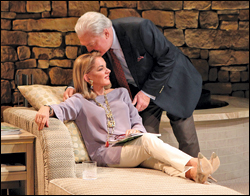
Afterwards, the four of us got so lost in conversation, analyzing the plot and debating whether the daughter
was justified or not in going forward with her book that I didn’t notice when Stockard Channing (who had brilliantly
played the mother as the most chilling Jewish WASP wannabe imaginable) strode down the block after signing autographs
for fans and nearly mowed me down.
Aidan finally departed to meet some friends, and Allegra, who felt like getting some air, proposed that we
walk the two miles or so from 45th Street and Broadway to the Roosevelt Island Tramway at 59th Street and Second. By the time
we had returned to our car, it was well after midnight. Only then did anyone check directions to our hotel and discover that
it wasn’t nearby at all. It was way out near Kennedy Airport!
Directions or not, we spent quite awhile driving
around, hopelessly lost in Queens. When we’d finally made our way onto the Long Island Expressway, around 1:15 a.m.,
I was not pleased. “This had better be some amazing surprise you’ve planned,” I told my husband. “Like
you wake me up in the morning and say, ‘Guess what! We’re flying to Paris. Or Jamaica.' ” But no, we were
just going to Jamaica, Queens. Near JFK.
We arrived at the Clarion at 1:45
a.m. At least the place had free parking. But the lobby smelled. Bad. I lifted the end of the mattress to check
for bed bugs. Then, seeing none, went straight to bed.
Never in my life have I been so happy to turn back the clock and mark the end of Daylight Savings Time
with an extra hour of sleep.
Fortunately, it was far easier finding our way back in broad daylight, and the four
of us reconvened late the next morning at our favorite brunch spot, where Chelsea’s formerly much-loved landmark, the
Empire Diner, has been reborn as The Highliner. Unlike at many city brunch spots, its breakfast specials, such as my omelette with spinach, cheese and home fries,
don’t come with a choice of Bloody Mary or Mimosa. But we didn’t need anything to boost our spirits when actors
Danny DeVito and Rhea Pearlman wandered in with their son Jacob and were swiftly seated at the very next table. Unlike at many city brunch spots, its breakfast specials, such as my omelette with spinach, cheese and home fries,
don’t come with a choice of Bloody Mary or Mimosa. But we didn’t need anything to boost our spirits when actors
Danny DeVito and Rhea Pearlman wandered in with their son Jacob and were swiftly seated at the very next table.
This was our first celebrity sighting in quite some time (not counting my near-collision with Ms. Channing
the night before), and our kids, now jaded New Yorkers, ordered us to keep cool. Allegra began text-messaging
threats to her Dad, who was seated directly across from her, to not dare take a photo with the iPhone he was brandishing.
And I am happy to report that she succeeded in restraining him. (The photo you see at left is merely a paparazzi
shot I found online.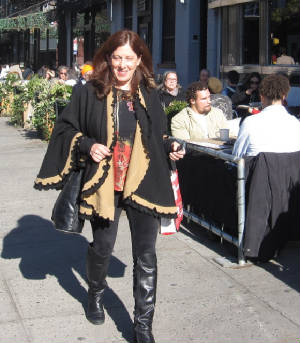 ) )
In no hurry to return to our arctic abode, we spent the rest of the day wandering the streets and exploring
the stylish indoor shopping complex Chelsea Market. But at last we could delay no more. It was getting dark and time to return
to the igloo we called home.
My husband began phoning neighbors manically as we wended our way back, eager to know
whether power had possibly been restored. I told him not to waste his time, and, indeed, with sinking hearts, we
returned to Day 9 in a pitch-black house without heat. At least we now had the generator in the yard, which we promptly filled
with gas. Then, while waiting for the upstairs to become habitable, I set about preparing dinner.
If necessity is the mother of invention, then a power failure may be its wicked stepmother. During the previous
week, I had grown increasingly more resourceful and less demanding, learning to make myself weak tea in the morning by running
the faucet until the water grew hot enough to soak up some flavor from a tea bag. I’d also learned to wrap all
sorts of food in aluminum foil and heat up meat, once-frozen vegetables and all sorts of leftovers on the grill, as well as
use it to toast bread. Still, my husband thought I had lost it when I promised to warm up the soup and sandwiches
we’d brought back from the city. How do you grill soup?
“Easy,” I replied as I emptied the two pint-sized containers we’d purchased into two
separate pots and placed them on the grill until their contents began to simmer. The only trick was making sure to use a potholder
afterwards. Boy, those handles were HOT!
Still, it was dispiriting to wake up the next morning and begin Day 10 in
the dark. The generator, which only held enough gas to run for eight hours at a time, had shut off in the middle
of the night, so our bedroom was once again frosty.
While filling the tank myself, since my husband had already left for work, I inadvertently dislodged the
long plastic nozzle at the end of the red plastic gas container, then watched as it disappeared into the generator.
It took me a good half-hour to fish it out with a pair of salad tongs.
Then I set about emptying both the refrigerator and freezer into the garbage. Hundreds of dollars worth of
food had spoiled. Worst of all, though, were the priceless items, like the many quarts of chicken soup I’d made
before Yom Kippur, expecting them to get us through the coming winter whenever anyone got the sniffles or the flu. They’d
taken me a whole day to lovingly prepare, carefully dicing the chicken and slicing the carrots. It was heartbreaking to simply
throw them out.
But in the preceding 10 days, I also had developed a new sense of ruggedness, along with a fresh perspective
on what’s important in life. Who needed electricity, really? Why worry about heat when you could simply throw on a warmer
nightgown, or gloves, a hat and another sweater? I was beginning to lower all of my standards. Weak, lukewarm tea suited me
just fine.
Still, I can hardly begin to describe the feeling when, just after 4 that afternoon, in one split second,
without the slightest warning, all of the lights went on around me and, with a hushed hiss, the house came back to life. As
I ran outside to turn off the generator, a neighbor strode by and I leaped into the air, arms and legs akimbo, like a
football fan whose favorite team has just scored the winning touchdown.
Let
there be light. And heat!
“We’ve got power!” I screamed when my husband answered at the office. But what I really
meant was something else entirely. I was thinking, “The war is over! We survived!”
Never mind tea, or real toast,
or electric stoves, or any kind of stuff. Horrible things happen in life. And not all bad things come to an end.
But we’re both fine… and our children are alive. Yes, we may have small, furry animals scurrying around in our
basement this winter. But we have won the war. We survived.
Wednesday, November 2, 2011
A Word From the Weiss
If this is Wednesday, then this must be my blog. But I am much too tired to write it. Too tired to put words together. Too
tired to tell you why I am too tired.
The problem is that even if I don’t have the energy, I do have the power. The power to connect. The
power to communicate. And that, I have learned, is something too precious to waste. So I’m going to do my best here.
Just let me try to explain.
It all started just last Saturday, although that now seems like another lifetime. Or
maybe like life on another planet. So far away. So long ago.
We had so many nice plans for the weekend. We
were meeting friends for dinner and a movie on Saturday. We had a close friend’s surprise birthday party on Sunday.
And Monday night, of course, would be Halloween. We were all geared up for that.
Yes, we’d heard some vague
warnings on the news about a little snow over the weekend, but that seemed like some sort of old wives’ tale. A practical
joke. Or more like an impractical one. How could it snow? It’s been such a balmy fall that I’ve barely
had the opportunity to throw on a sweater, let alone a scarf. And wasn’t it only October?
In anticipation of this month’s most popular holiday (and no, I don’t mean Yom Kippur,
Sukkot, Simchat Torah or Shimini Atzeret), I’d plastered a smattering of ghoulish decorations
on the front door and begun stockpiling candy. Since my husband tends to start bingeing on this the moment that it appears,
my basic strategy is to buy it at almost the last minute – although not so late that the only things left at the store
are nasty items like Necco Wafers and Circus Peanuts, which nobody likes, including trick-or-treaters.
I’d also begun fielding a steady stream of comments and queries from my daughter regarding her costume
plans for the occasion. A major devotee of Halloween disguises, Allegra tends to begin planning her holiday get-up months
in advance, but then, of course changes her mind myriad times as the event approaches. There was only one option that she
could rule out easily, and that was because she wore it last year, and no matter how much she spends on it, which is usually
a bundle, she never, ever repeats.
She spent so much last year, in fact, that I was considering wearing her
costume myself this year. Never mind that the label, as I recall, identified this outfit as something along the lines of “Saucy
Antoinette,” “Sassy Antoinette,” or perhaps her popular cousin, “Slutty Antoinette.” We’d
sunk upwards of 60 bucks into this ensemble, including the non-returnable too-tight version that we’d initially ordered
online, and then it had been worn for only part of one night. I wanted to get our money’s worth.
Allegra, meanwhile, had come up with a game plan of her own, and to my surprise she was standing firm for
once, rather than continuing to dance circles around the issue. Then again, you might say she was indeed dancing around it
because the one thing she’d set her heart on from the start was the lead character from the movie Black Swan.
Even when I told her that I’d seen on the Today show, or perhaps Kathie Lee and Hoda, that Black Swan was the
No. 1 costume for women this year, and that she was bound to be up to her kohl-darkened eyeballs in competition from fellow
Natalie Portman impersonators, she failed to be remotely discouraged.
Unfortunately, she also failed to be motivated
enough to go out and purchase any of the necessary accoutrements, though, so on Saturday morning she phoned me to report that,
to her great distress, New York City dance shops were totally out of tutus. I called one I found online myself, just to be
sure, and was told that they had one left, but it had been reserved by someone else, and anyway this item she’d wear
once cost $59. The only tutu on craigslist was reportedly from the actual Bolshoi Ballet and cost $500.
So I emailed Allegra the address of a fabric store downtown that, according to its Web site, had tulle for
$2 a yard… along with a video on how to make your own tutu.
She replied that she was too busy to shop, though,
since she was busy preparing for a well-paid singing gig she’d gotten for a private party that night – four straight
hours of Sinatra tunes. She said that she’d simply shop for all of these supplies on Sunday.
I realized that, at nearly 22 years of age, she was much too old for me to be getting involved in her Halloween
costumes anymore. Or is she? I’m her mom-ager. And if Kris (Kardashian) Jenner, the world’s best-known mom-ager,
could take to the airwaves to explain why her 31-year-old daughter was getting divorced 72 days after her multi-million-dollar
wedding, then it seemed easily within the realm of reason for me to run an errand for my own daughter while she was off preparing
to perform. Besides, I knew that fabric stores aren’t open on Sundays, especially in New York City, and that by the
time Monday rolled around there’d probably be no black tulle to be had anywhere closer than Tel Aviv (where there may
be many a Natalie Portman fan, but no trick-or-treaters, I assume).
I also knew that my son’s New York City apartment mate, Dara, who happens to be the daughter of our
neighbors two doors down, had come home for the weekend to do her laundry. So I figured that I’d save my daughter some
heartache (as well as some dough, since everything costs twice as much in New York as it does in Connecticut), and go to the
nearest fabric store at home, then send all the supplies back with Dara.
By mid-afternoon, though, I looked out the window
and discovered that, to my enormous disbelief and mounting horror, it had actually and truly begun to snow.
I’m not talking about some little flurry, or a delicate dusting of fine powder. These were mammoth
flakes, fluttering down in such abundance that it looked like the sky was overrun with flocks of white doves. By the time
I’d located last year’s winter coat and begun to drive over, the roads were heavily blanketed and slick enough
to be treacherous. So I was hardly surprised to receive a text message from our friends cancelling our plans for that night.
They proposed postponing until Sunday. Unfortunately, we had that birthday party, in honor of a very close friend’s
60th, so we would be unable to join them.
At least I managed to reach the fabric store just before it closed early for the day due to the storm, then
to score its last five yards of black tulle, along with some satin ribbon, black elastic for a waistband, and Velcro to fasten
it, all for about 12 bucks.
The drive back through what had turned into a raging blizzard was so hazardous, though,
that I began to realize I had just risked my life to buy my daughter some cloth.
Some cloth that might never reach
her, no less, since it turned out that Dara was attending a Halloween party in the city that night and had already returned
home.
Never in my lifetime had it snowed during October, to my knowledge, and we soon learned why that’s
a fortunate thing. The trees were still so enveloped in foliage that they trapped the falling snow like giant catchers’
mitts and soon doubled over under its weight. Heavy branches and entire trees began to snap and tumble onto power lines. I
had to keep doubling back to avoid streets closed due to one or both of these hazards. Once home, I learned that we had lost
power, not just in my house but the entire town.
My husband had purchased a small generator after a prolonged power failure last summer. But this was deafening
to listen to and not powerful enough to be of much help. It powered a few lamps and the microwave. We also hooked up the TV,
only to discover that the cable was out. We spent the evening inside sitting in a cold, dimly lit house
with my friend Liz, who walked over, sipping enough wine to conk out early. Then we kept waking up all night, alarmed by unnerving
cracking sounds as large branches and whole trees snapped under the weight of the snow and crashed onto the ground.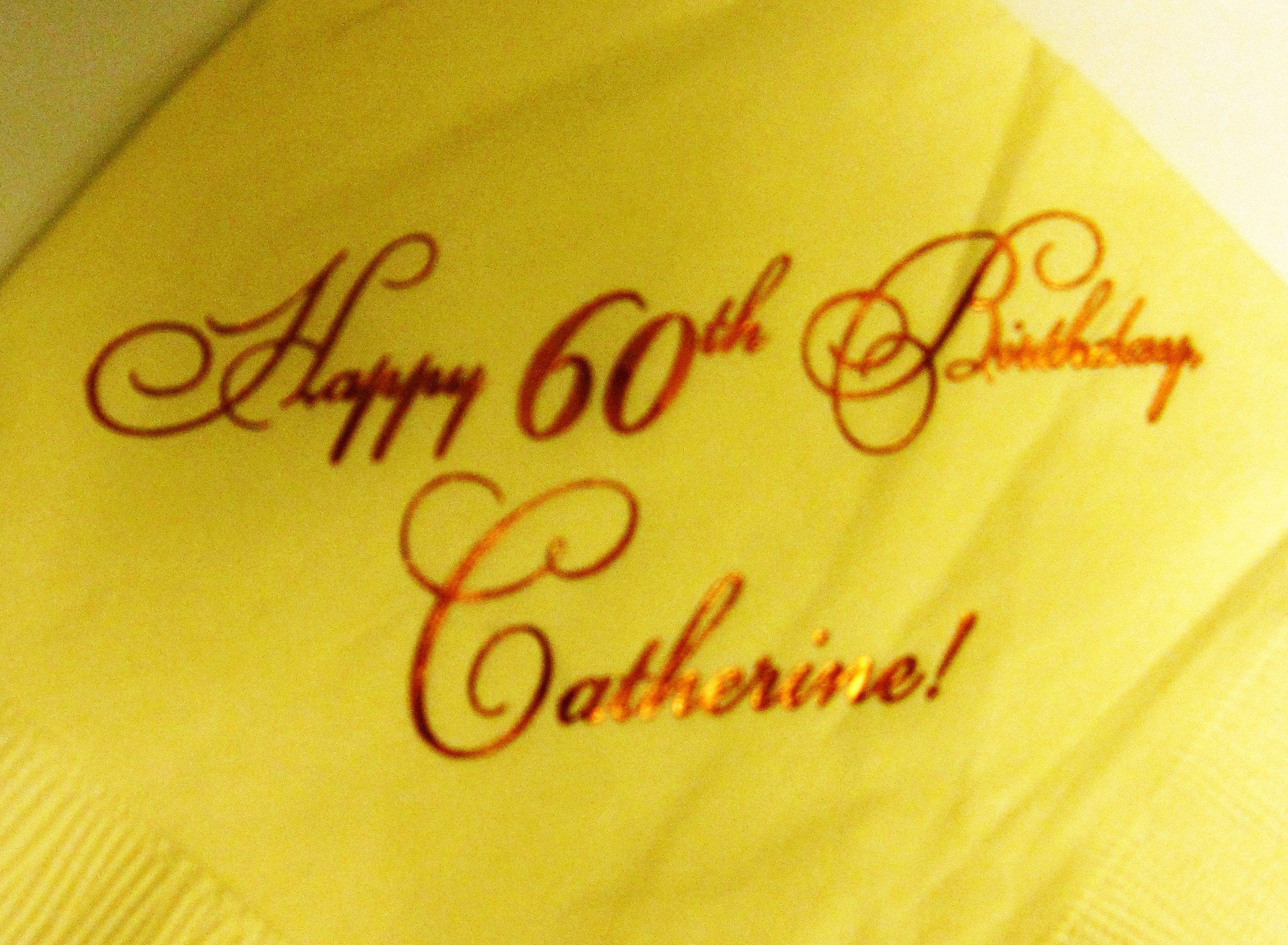
We awakened Sunday to a house that felt as cold as a refrigerator (54 degrees, according to our thermostat).
At least we had plans to get out to that party for much of the day. But it turned out that the restaurant where it was to
be held also had no power, so it had to be canceled as well. My poor friend Catherine had to grapple not only with the dubious
honor of turning 60, but also the rather unwelcome surprise that many of the guests had not been alerted before traveling
there from out of town, and she had to entertain them all at her house unexpectedly, although she had nothing to feed them.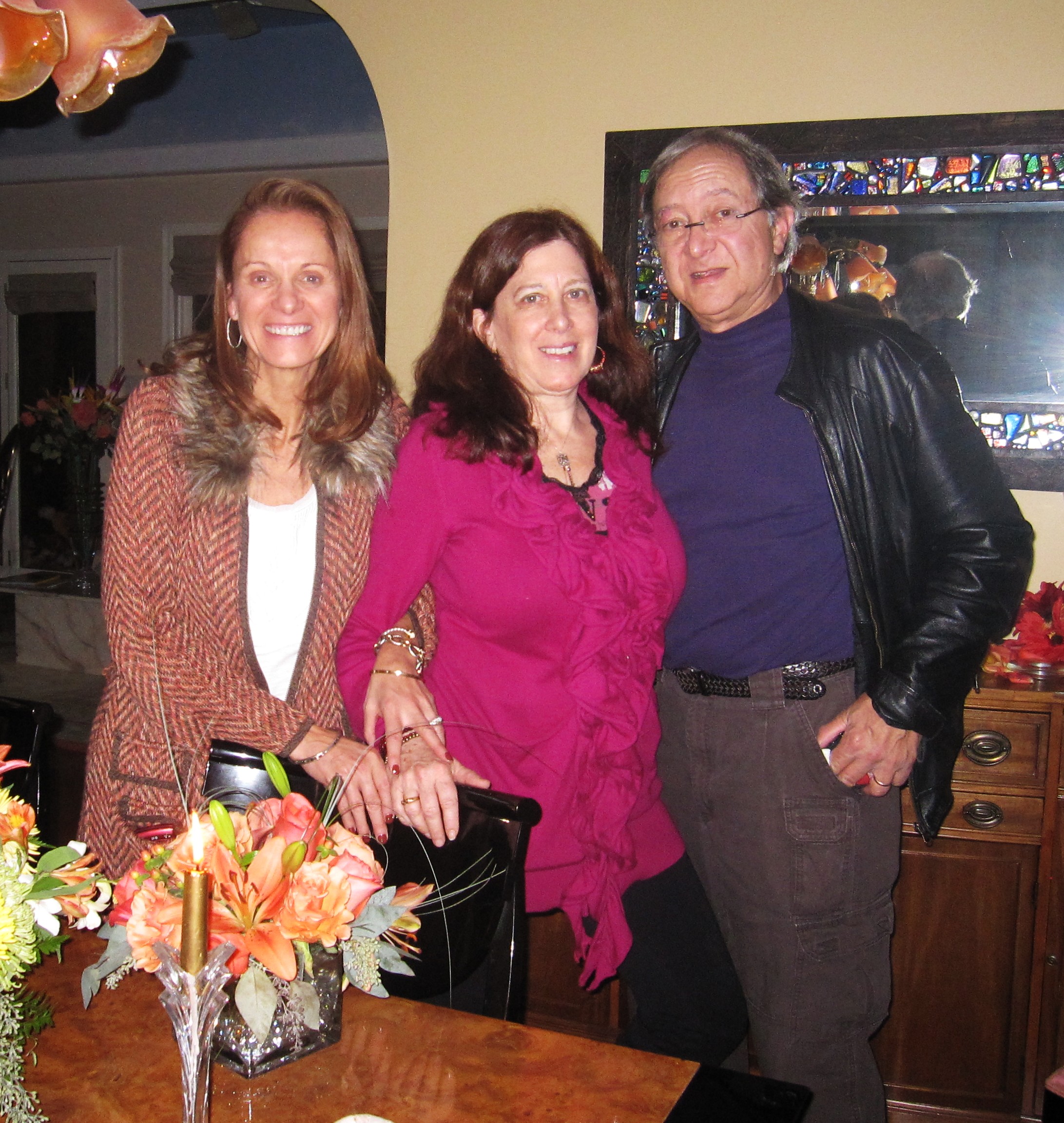
At least she had a generator that lit part of the house, as well as plenty of heat. She also managed to collect
the gorgeous birthday cake and flower arrangements from the restaurant, then have her daughter Cajai, who’d planned
the party, pick up pizzas. Rather than rescheduling the event, she decided to proceed with it at home, although many people
were blocked in their driveways or streets by downed trees, so only about a third of the 92 expected guests could make it
over, including my husband and me.
Everyone made the best of it, though, and we probably even enjoyed ourselves
a little too much and overstayed our welcome. Yes, Catherine is one of my best friends, and we welcomed the chance to chat
with her and her husband Jaimoe after the crowd had cleared. But we also were in no great hurry to return to a cold, pitch-black
house.
I also must admit that I brought along my daughter’s costume supplies in the car, hoping that one of
the guests might be returning to New York and willing to bring them to her. But no one was headed in that direction, so I
simply brought them home again.
I fantasized about going to the bus or train station the next morning and seeing if
I could convince any stranger to transport my light bundle, and then have Allegra meet them at the station. Of course, these
days we are warned constantly not to transport packages for strangers. How could I convince someone that there were no drugs
or bombs inside the bag, only elastic, ribbons and enough tulle to make a tutu or two?
When we got back, after wending our way through darkened streets blocked by felled trees and fallen power
lines, I sat outside in my car for half an hour charging my cell phone with my car charger. It was so much warmer in there
than in the house that I briefly considered sleeping in it. Instead, we made our way upstairs with flashlights and huddled
under the covers. It was below freezing outside and not much cozier indoors.
Monday, I discovered that most
homes in our region were still without power, and President Obama had declared a state of emergency there. It was way too
cold to stay inside my house, which was now a giant refrigerator. But the few local restaurants with both food and power were
mobbed. Worst were the ones that offered free Wifi, since everyone was desperate to recharge their devices and find an Internet
connection.
I, of course, was also in that boat, so I joined the hordes hovering inside a Panera Bread near my house,
where the scene made me wonder if I were in old Communist Russia. A long line snaked out the door, and inside children were
crying and screaming as adult patrons stood or squatted in every available inch of space and frantically jockeyed for empty
chairs and, even more precious, open electrical outlets.
Then again, when I finally miraculously found one of each, I noticed
an unusual spirit of camaraderie breaking out among the masses. A group of college students sitting near me happily let me
connect my phone and computer chargers to their power strips. When a man arrived desperate to email a file to someone, they
eagerly juggled the plugs to accommodate his, too. A woman beside me offered to share her table with a total stranger, then
braved the food line to buy her a cup of coffee. That woman later bought an entire coffee cake for all the students because
they’d helped her plug in too.
And as people in my section began to leave, although they’d been
total strangers till then, they kept bidding each other a warm farewell, declaring, “See you tomorrow!”
Along with all the strangers, I
also ran into so many people I knew well that I ended up staying for hours. (Half of my town is Jewish, and Jews evidently
favor Panera over both Dunkin’ Donuts and McDonald’s, although that’s no great surprise. It has much better
food!) But finally I had to leave, because power or not, we were expecting guests.
Several years ago, we invited our good friends Dial Parrott and Sally Wister to come over for Halloween,
after learning that no children visited their house in their nearby town. Since then it had become a tradition to spend the
holiday together. Last year, Sally had shown up as usual in a voluminous vintage pumpkin costume that she is proud to admit
she liberated years ago from the dump at her college. This is constructed of such heavy felt fabric that she normally can
only stand to keep it on inside our house for a few minutes before removing it. This year, I had advised her to wear it and
keep it on. Better yet, wear something that could fit under a coat, and then keep the coat on.
Then again, considering that they’re
WASPS, coming to an unheated house for the evening was no major deal. They tend to keep their house way on the chilly
side in winter anyway, if you ask us.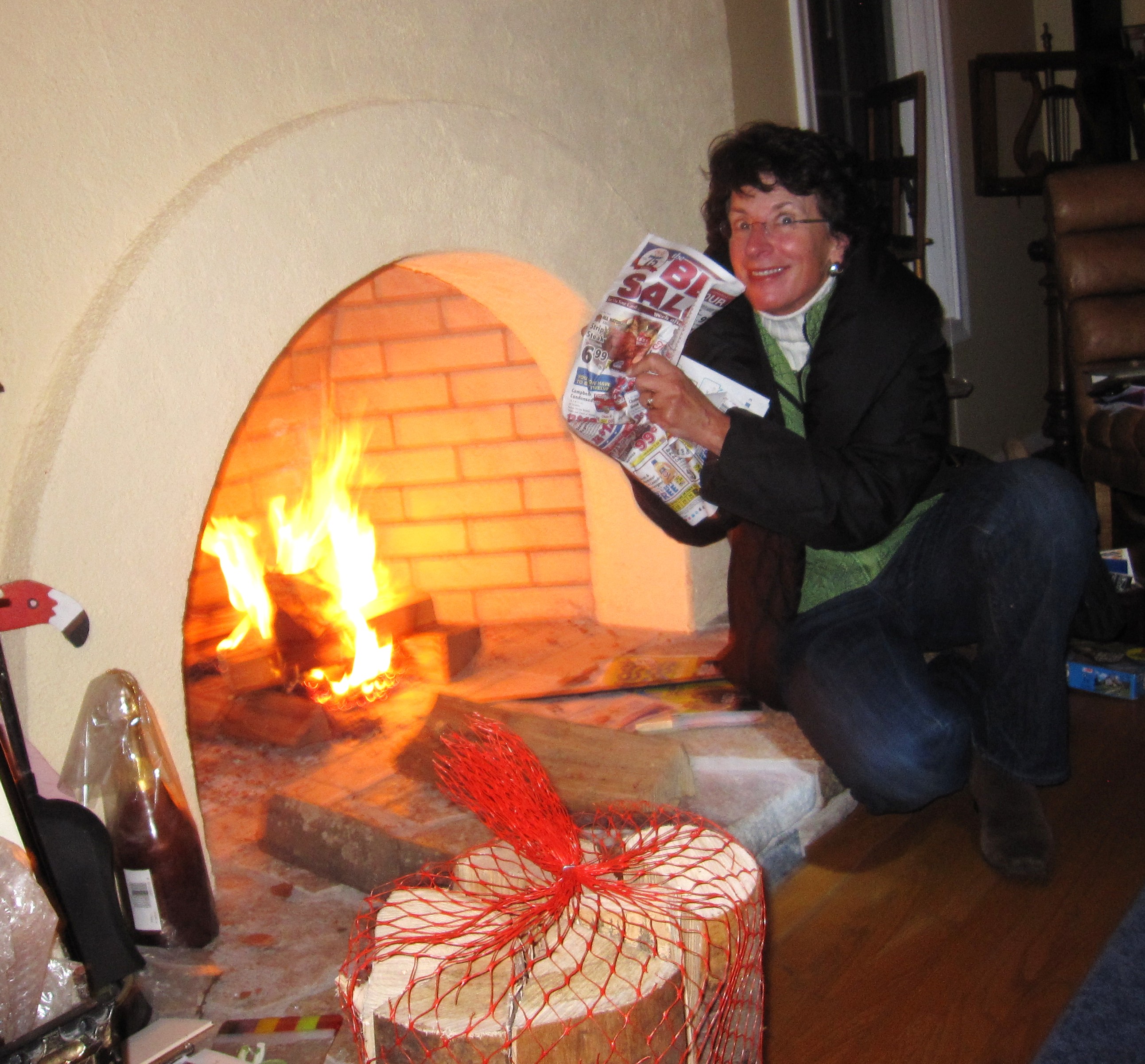
To make our inside temp more tolerable, though, Sally offered to help build a fire. Although we have a working
fireplace, we had never once lit a fire in it during the dozen years that we’ve lived there. My husband, whose family
never lit fires, had always been convinced that if we tried to use the fireplace, the house would immediately burn down. Now,
under the circumstances, I gave him no choice. It’s not a good thing to invite people over, then have them be able to
see their breath in the air inside the living room. Sally sent me outdoors to collect kindling and within minutes we had hot,
roaring flames.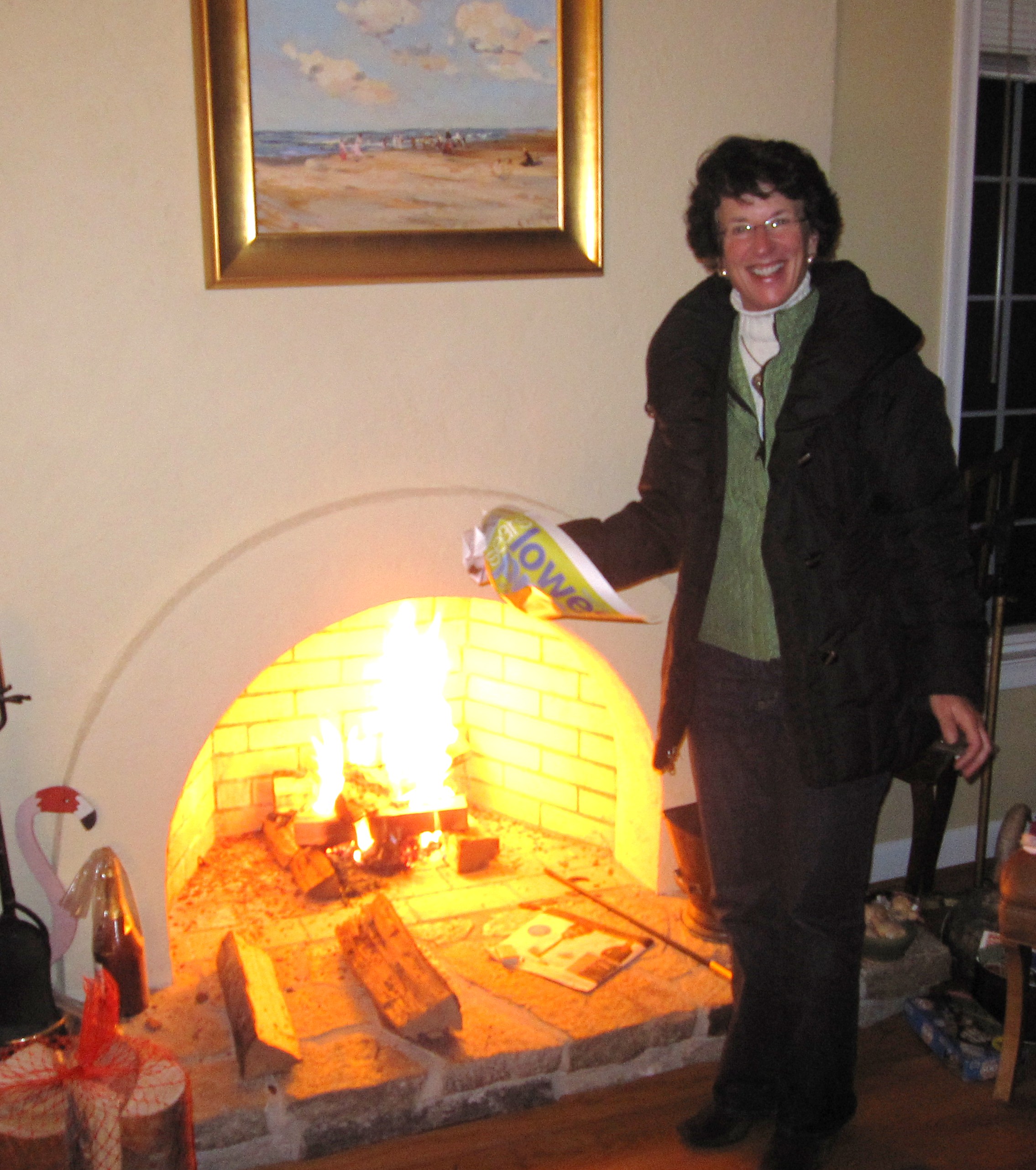
Sally also had proposed that, given our circumstances, we eat out rather than have me try to prepare dinner
without any power in the house. I insisted on staying home until 8, however. Although the town’s mayor had cancelled
Halloween, decreeing that trick-or-treating was much too dangerous through dark streets filled with tree limbs and fallen
power lines, I found it hard to believe that kids wouldn’t come anyway. But not one did.
Usually, when we tried to eat dinner
with these friends on October 31st, we were interrupted by a doorbell ringing every few minutes. I always enjoyed seeing the
colorful costumes and opening the door all dressed up ourselves. But now we were treated to endless calm and silence. Not
a ghost or superhero in sight, let alone any Black Swans. It was more than a little dispiriting for my taste. But Dial, comfortably
sipping wine on the sofa, declared it the best Halloween ever. 
I served such heavy hors d’oeuvres, as usual, that no one was hungry anymore. Even so, we ultimately
dared to take off for our favorite local Italian eatery, Treva, where we made quite a stir when we arrived wearing a set of
novel, vintage-style paper masks. It was a pleasure just to sit somewhere with both heat and light, not to mention pasta.
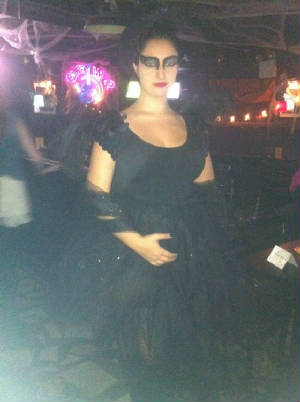 But to me the true high point of
the night came after we returned home, when Allegra sent me a single photo that said it all. Her friend Mystral and Mystral’s
mother had bought her 10 yards of black tulle, along with elastic, ribbons and feathers. OK, so they’d spent 20 bucks
versus my 12. But Allegra had fashioned this fabric, along with her new black dress, into a full ballet get-up and managed
to work pure magic with makeup. Then they’d made the scene at the infamous annual Greenwich Village costume parade,
where people had continually stopped her on the street and asked to snap her picture. Never mind how many competitors there
were. She was indeed… Black Swan! But to me the true high point of
the night came after we returned home, when Allegra sent me a single photo that said it all. Her friend Mystral and Mystral’s
mother had bought her 10 yards of black tulle, along with elastic, ribbons and feathers. OK, so they’d spent 20 bucks
versus my 12. But Allegra had fashioned this fabric, along with her new black dress, into a full ballet get-up and managed
to work pure magic with makeup. Then they’d made the scene at the infamous annual Greenwich Village costume parade,
where people had continually stopped her on the street and asked to snap her picture. Never mind how many competitors there
were. She was indeed… Black Swan!
I, in turn, texted her back a photo of her father. No, he wasn’t dressed as the Devil. He was just
wearing a nightcap. It was now so cold inside our bedroom that, despite our having two down comforters, he was obliged to
sleep wearing his warmest fleece hat!
Word was that power might not be restored for a whole week, and, hat or
no hat notwithstanding, my husband said that he couldn’t stand the cold anymore. Personally, I was having an even harder
time with life as we were beginning to know it because I don’t have an office to go to all day. I had the choice of
either staying at home with no heat or braving the huge crowds in the few public venues open for business. Fortunately, at
his urging, I’d gone online on Monday and reserved a hotel for Tuesday.
Having heard that every hotel in our town and those surrounding it was booked, I’d considered myself
lucky to find an affordable vacancy at a Ramada Inn at the nearest airport, Bradley International in Windsor Locks, about
16 miles away. Not knowing how long the blackout might last, I’d taken it for Wednesday as well. But when I woke up
on Tuesday morning, I began packing frantically as though I were going away for a week. Perhaps we would end up being away
that long. Or maybe, now that I was getting away, I couldn’t stand the thought of coming back to these conditions anytime
soon.
I kept getting phone calls from so many people, though, and it was just so bleeping cold, that I couldn’t
seem to get going or organized. My friends Pat and Liz both seemed equally stressed out, so before leaving town I ended up
meeting them for a quick lunch at Whole Foods (also mobbed, but a place to plug in and recharge our various devices). And
then, once there, inertia set in. We sat there for hours, just talking about our angst.
How hard it was to explain our overwhelming anxiety to people who weren’t there. My daughter, son,
and brother had been calling me daily to find out if we had power yet. “You don’t understand,” I kept replying
in frustration. We weren’t on the verge of getting power back, never mind anything else resembling normal life as we’ve
always known it. The entire area was in total turmoil and chaos. Everywhere, towering trees hundreds of years old had crashed
into people’s yards if not right through their houses. Gas stations were cordoned off with yellow tape because they’d
run dry or couldn’t operate without electricity. Many traffic lights were out, causing backups at intersections. And
no one could say when power would return, although word was that it would be at least a week.
“We’re in survival mode,” my friend Liz declared, admitting that she’d broken down
and actually cried at one point. It made me feel better for being on the verge of hysteria. (When Allegra had called earlier
that day to announce that she had a small problem, the closest thing to sympathy I’d been able to offer her was an earful
of maniacal ranting.) All of us were unusually hungry, too, although I wondered if this was merely a product of anxiety or
the result of our bodies working overtime to keep us warm inside frigid homes.
All of us also were strongly inclined
to stay put no matter what, although we conceivably all could have left town for normal civilization. I thought it might be
akin to how I imagine a boat captain feels in a storm: It’s your duty to go down with the ship.
Given that, I felt more than a
little guilty to be deserting my home and my friends for a heated hotel. I felt abashed that we could afford it when so many
others couldn’t. But my husband hadn’t slept well in days, hat or no hat, and I’d found that cheap room.
And as I began to contemplate the unimaginable luxury of it all – a hot shower, heat, light and the Internet, not to
mention a working TV – my blood began to race with joy.
So it was more than a little disconcerting when
I got off the highway at the airport exit early that evening and discovered that this region, too, was dark and deserted.
Although an occasional plane flew overhead, every business lining the road hovered in spooky, dark shadows, from chain hotels
and gas stations to McDonald’s and Taco Bell. Most were so difficult to identify in total darkness, in fact, that I
saw nothing resembling a Ramada Inn. Finally, after driving for miles, I doubled back. That’s when I saw it.
It was completely unlit. It was almost completely deserted. But there were a handful of cars scattered in
the parking lot. So, with a sinking heart, I pulled in.
The front door was locked, and the lobby inside empty and black.
Yet a hand-printed sign taped to a window advised me to “USE OTHER DOOR.” So, with mounting trepidation,
I approached a side entrance, where a burly man in a zippered fleece top suddenly stepped out. A maintenance man?
Mugger? Or hotel clerk out of uniform?
The last, I gather. “We’re open,” he assured me. “But we have
no power. There are no lights or heat.”
I stared at him in disbelief. “No lights? No heat?!! How could
you take a reservation without indicating that?” I asked. I admitted that I’d booked online. But my husband had
confirmed all the details with the chain’s toll-free main number earlier that day. They’d given him directions
and filled him in on check-in time. Couldn’t they have mentioned something like no power then?
The man shrugged. Ramada’s 800 number knew nothing about their plight, he said. As for nearby hotels
equipped with generators, he said there was only one. Then he pointed toward a Hampton Inn a bit down the road that was lit
up like a royal palace.
And before wasting another second, I jumped into my car and raced right to it.
The lobby was gleaming and well-lit.
There were large urns in the adjacent dining area steaming with hot coffee. I’m in heaven, I thought, as I quickly related
my problem to the young man standing behind the front desk. He nodded blankly without smiling.
“I’m sorry to hear
it,” he responded. “But we’re completely booked for the night.”
Then he answered a phone call and
proceeded to ignore me for about five minutes while he gabbed endlessly to another guest. I kept standing there in shock and
disbelief. My husband was covering a town meeting for the newspaper at which he works and expected to meet me there in about
an hour. He, too, was all packed and eager for a hot shower and warm, cozy bed. How would I possibly tell him to forget about
it all and just go home?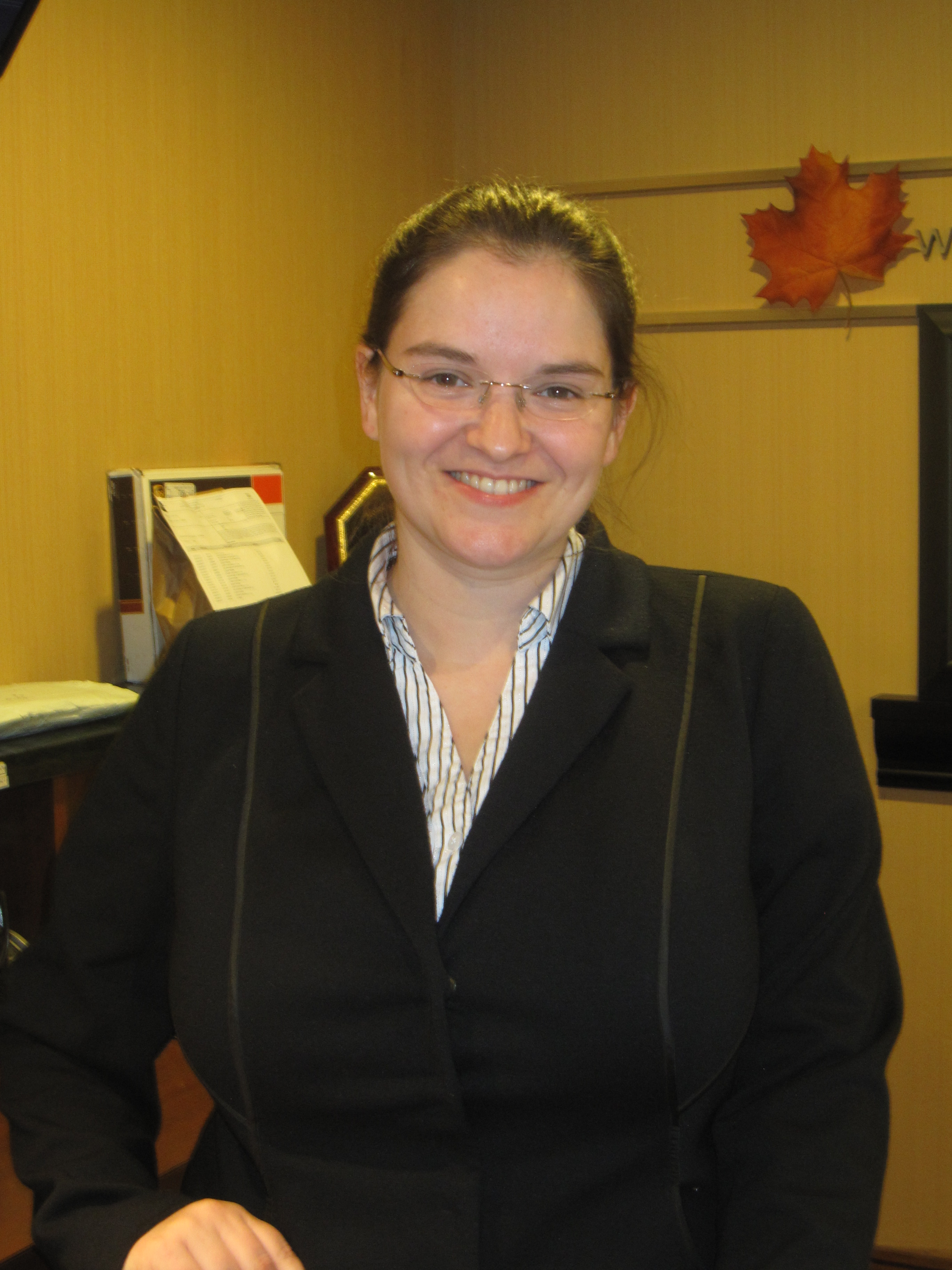
Then a door opened behind the front desk and a young woman emerged from it. “Can I help you?”
she asked congenially.
As useless as it seemed, I sighed and forlornly reiterated my pathetic tale of woe.
“But I understand that you’re all booked up,” I concluded.
“We are,” she agreed.
Then she leaned toward me and began to whisper. “The thing is, I just got a last-minute cancellation,” she said.
“Don’t tell anyone because I’ll get in trouble.” Presumably there was a waiting list. “If anyone
asks, you had a reservation. But we do have a room, with two double beds, and if you want it, it’s all yours.”
That’s when I began to cry.
It was twice the price of the Ramada. And the indoor pool and fitness
room were both out of commission, since the generator could handle nothing beyond the rooms. But a full, hot buffet breakfast
with eggs, waffles and fruit in the morning was included.
I took it, of course. Who could refuse a room in heaven?
The one restaurant in town with
a generator ran out of gas before my husband arrived. No matter. I’d brought along enough snacks, fruit and yogurt to
pass for dinner. Besides, we were too beat to go anywhere and eager to watch Glee… on a working TV!
 I still feel sorry for the kids
in town that Halloween got cancelled. Maybe when we go back home, I’ll go out walking from door to
door handing out candy to all of them. Better than sitting in an ice-cold house.... or letting it sit there until
my husband eats it. I still feel sorry for the kids
in town that Halloween got cancelled. Maybe when we go back home, I’ll go out walking from door to
door handing out candy to all of them. Better than sitting in an ice-cold house.... or letting it sit there until
my husband eats it.
To liven things up, I could even go as Black Swan. I still have plenty of tulle.
Fewer than 2,000 homes in my town
have had power restored… out of 28,000. But they hope to have everyone back on line by midnight Sunday. Or maybe Monday.
Who cares? We’re sleeping here for two nights. And soon it will be the weekend. Maybe after a good night’s
sleep and a shower, we’ll be ready to brave the cold again. And battle the elements. Unlike WASPs, we like it hot. But
we'll be OK. We're pioneer Jews now. We’re in survival mode.
5:06 pm
|
|
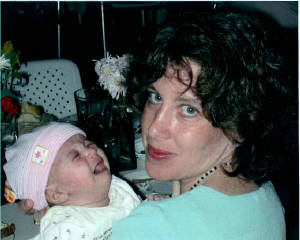
|
| That's me. The redhead on the right. But that is NOT my baby. |
No, sir, that's not
my baby. How could any mother smile beatifically while her own child wailed? Never mind that neither of my offspring
ever cried so plaintively, as far as I recall (not while I was there to nurture them through their every perceptible
need... although my son still complains that I often dressed him in garish and girlish color schemes, scarring him FOR LIFE). Besides, I'm distinctly beyond prime
delivery age ("Kitchen's closed!" as my mother might say), and my kids had departed the diaper stage by the
dawn of the Clinton Administration. Now in
their 20s, both are currently living on their
own, in not-too-distant cities, although each manages to phone me daily. In fact, to be exact, several times a
day, then sometimes text me, too. (That may sound excessive, and emotionally regressive, but I subscribe to
the Jewish mother's creed when it comes to conversing with kinder: Too much is never enough.)
Two demanding decades spent raising two kids who are kind, highly productive and multi-talented, who generally
wear clean underwear (as far as I can tell), and who by all visible signs don't detest me are my main credentials
for daring to dole out advice in the motherhood department.
Presenting myself as an authority on all matters Jewish may be trickier to justify. Yes, I was raised Jewish and am biologically an unadulterated, undisputable, purebred Yiddisheh
mama. I'm known for making a melt-in-your-mouth brisket, not to mention the world's airiest matzah
balls this side of Brooklyn. My longtime avocation is writing lyrics for Purim shpiels based on popular Broadway productions,
from "South Pers-cific" to "The Zion Queen." Then again, I'm no rabbi or Talmudic scholar. I
can't even sing "Hatikvah" or recite the Birkat Hamazon. Raised resoundingly Reform, I don't keep kosher, can
barely curse in Yiddish, and haven't set foot in Israel since I was a zaftig teen. Even so, as a longtime writer and ever-active
mother, I think I have something to say about being Jewish and a mom in these manic and maternally challenging
times. I hope something I say means something to you. Welcome to my nice Jewish world!
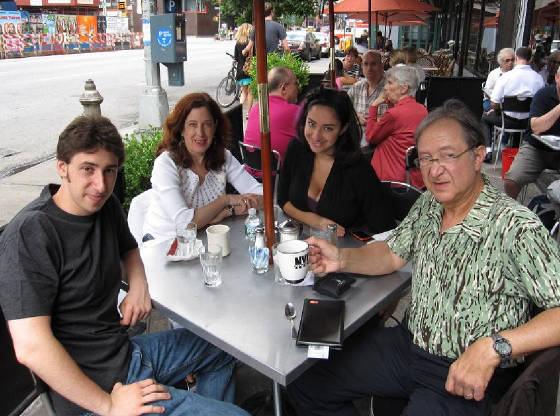
|
| LEVYS! MEET THE LEVYS! WE'RE A MODERN JEWISH FAMILY... |
In coming weeks, I will continue
posting more personal observations, rants, and even recipes (Jewish and otherwise). So keep reading, come back often,
and please tell all of your friends, Facebook buddies, and everyone else you know that NiceJewishMom.com is THE BOMB!
********************************************* The family that eats together (and maybe even Tweets together):
That's my son Aidan, me, my daughter Allegra, and Harlan, my husband for more than 26 years, all out for Sunday brunch on a nice summer weekend in New
York.

|